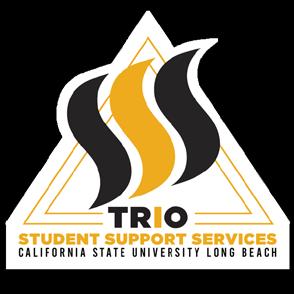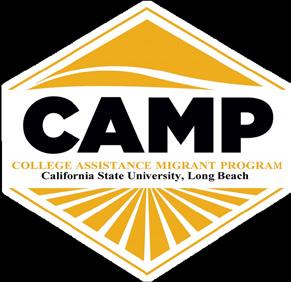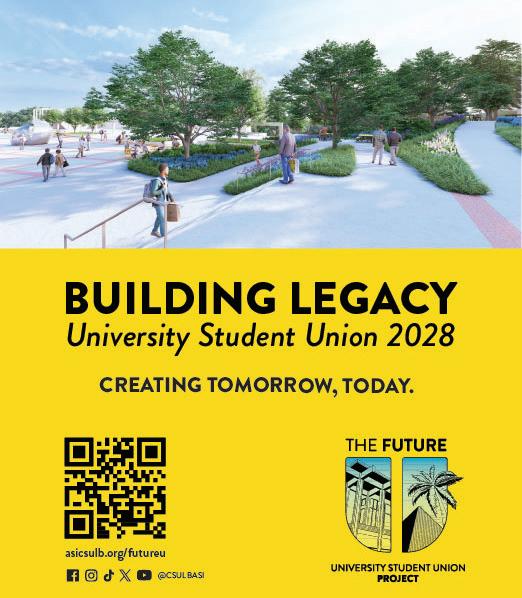LONG BEACH CURRENT
LONG BEACH STATE’S NEWS SOURCE SINCE 1949








LONG BEACH STATE’S NEWS SOURCE SINCE 1949







1250 Bellflower Blvd., LA4-203 Long Beach, CA, 90804
Phone (562) 985-8000
El Nicklin
Sam Farfán
Acsah Lemma
Editorial Office Director of Business Operations Managing Editor Editor in Chief Community Engagement Editor
Linsey Towles
Multimedia Managing Editor business@gobeach.media managing@lbcurrent.com eic@lbcurrent.com community@lbcurrent.com multimedia@lbcurrent.com
Kristina Agresta
Editors
Juan Calvillo News Editor news@lbcurrent.com
Julia Goldman Arts & Life Editor arts@lbcurrent.com
Joannah Clemente Opinions Editor opinions@lbcurrent.com
Davis Ramage Sports Editor sports@lbcurrent.com
Jaylyn Preslicka Solutions Editor solutions@lbcurrent.com
Luis Castilla Design Editor design@lbcurrent.com
Khoury Williams Copy Editor
Samuel Chacko Photo Editor
Social Media Editor
Jazmyn De Jesus
Dante Estrada Video Editor
Aidan Swanepoel Podcast Editor
Photo credit: LAUREN BENSON/Long Beach Current Finals for the spring 2025 semester end May 17 and commencement ceremonies begin the next day, taking place for five days at Angel Stadium.
BY JAYLYN PRESLICKA Solutions Editor
Since last checking in with Long Beach State’s Campus Assessment & Stabilization Team in September, the program has seen an influx of calls over the 2024-25 academic year.
Damian Zavala, Long Beach State’s executive director of Student Health Services, attributes the rise in numbers to increased program awareness.
ing major budget cuts due to a decrease in General Funds. Enrollment will be maintained at its current rate to avoid increasing financial pressure on students and the university.
However, CAST workers Donna De Loera and Graciela Lopez manage a heavy caseload with the students they currently serve on campus.
During the Current’s interview with Zavala and De Loera, De Loera had to leave to assist with a call.
Zavala said the University Police Department utilizes the resource when responding to mental health crises.
Although these calls are scanned through the UPD’s dispatch service when an individual directly makes the call, CAST is also used as a preventative tool, according to Zavala.
According to the Monthly University Police Summary on UPD’s Instagram, CAST calls have decreased during the spring semester, with a slight increase during midterm exams in March.
These summary posts have only been available since June of 2024. The data for previous years is not readily available.
News Assistants Ethan Cohen
Arts & Life Assistants
Annette Quijada
Christopher Canche Chan
Mayra Salazar
Nasai Rivas
Delfino Camacho
Grace Lawson Diego Renteria
Opinions Assistants Lizbeth Cortes-Gutierrez
Romi Mathews Christine Nader
Sports Assistants Matthew Coleman
Alyssa De La Cruz
Matthew Gomez Jack Haslett
Soleil Cardenas Design Assistants
Angela Osorio
Timothy Hessen Copy Assistants
Bella Garcia
Photo Assistants Lauren Benson
Justin Enriquez
Devin Malast
Mark Siquig
Social Media Assistants Igor Colonno Selestino
Andrew Miller
Video Assistants Eduardo Contreras Jr.
Gianna Echeverria Podcast Assistants
Skylar Stock copy@lbcurrent.com photo@lbcurrent.com socials@lbcurrent.com video@lbcurrent.com podcast@lbcurrent.com BusinEss
Creative Director
Alexandra Gryciuk
“People are becoming more aware of CAST as a resource on campus, so they’re getting more calls,” Zavala said. “[...] It’s something we didn’t see a year ago.”
Currently, CAST is on campus from 7:30 a.m. to 7 p.m. Monday through Friday, or Saturday and Sunday.
There are currently two social workers responsible for attending to crisis calls that account for the entire student body.
Zavala said there is no update on whether the program’s hours and personnel will expand. In this case, the personnel would mean hiring additional social workers.
Regarding additional funding for the program, Zavala said, “We don’t know what the future will look like because we have a new administration.”
Over the past year, CAST has expanded its outreach in the Long Beach area, partnering with local organizations, Long Beach Met and the Restorative Engagement to Achieve Collective Health.
These are Long Beach-based services that could be utilized by off-campus students experiencing a mental health crisis.
“It would depend on the situation and the needs of the student. Sometimes the student is stabilized by CAST and then linked to an off-campus resource,” Zavala said. “Sometimes CAST becomes aware of a student in crisis off-campus, and we engage off-campus partners such as emergency services to support the student.”
The CAST program has also received international recognition. According to De Loera, York University, in Toronto, Canada, reached out to learn more about CSULB’s program.
Andrea Contreras Advertising Manager advertising@gobeach.media
Jennix Bien
Leila Nuñez Web & Technology Director
Nicollette Combre PR & Marketing Manager
Joseph Vargas Distribution Manager
assistants advisErs
Madison Yang distribution@gobeach.media beach.pr@gobeach.media web@gobeach.media creative@gobeach.media
Gary Metzker Design Adviser
Barbara Kingsley-Wilson Content Adviser
Jennifer Newton Advertising & Business Adviser
All California State Universities are experienc-
land acknowlEdgmEnt
“It’s definitely working [...] It’s a testament to the need for it. People are aware of [CAST] now,” Zavala said.
Here at the Long Beach Current we acknowledge that the school we report on is located on the sacred site of Puvungna, “the gathering place”. We are on the land of the Tongva/Gabrieleño and the Acjachemen/Juaneño Nations who have lived and continue to live here.
We also acknowledge the Gabrieleño/Tongva (pronounced: GABRIEL-EN-YO/TONG –VAH) and Acjachamen/Juaneño (pronounced: AH-HACH-AH-MEN/JUAN-EN-YO) as the traditional custodians of the Los Angeles region along with the Chumash (pronounced: CHOOMOSH) to the north and west, and the Tataviam (pronounced: TAH-TAH-VEE-YUM) and Cahuilla (pronounced: KAH-WEE-YAH) Nations to the east.
We respect and value the many ways the Tongva/Acjachemen cultural heritage and beliefs continue to have significance to the living people and remind us about the sacred and spiritual relationship that has always existed here at what we now call California State University Long Beach.
Editorials: All opinions expressed in the columns, letters and cartoons in the issue are those of the writers or artists. The opinons of the Long Beach Current are expressed only in unsigned editorials and do not necessarily reflect the opinions of the journalism department or the views of all staff members. All such editorials are written by the editorial board of the Long Beach Current.

lEttEr Policy: All letters and emails must bear the phone number of the writer and must be no more than 300 words. The Long Beach Current reserves the right to edit letters for publication in regard to space.
BY SAM FARFÁN Community Engagement Editor
Initially announcing a January 2025 reopening in early 2023, unexpected construction delays in the Child and Family Center’s $12 million renovation project postponed the center’s reopening date to the following academic school year.
It has been almost two years since the CFC closed its doors in late June of 2023. Losing the center meant losing the convenience of an on-campus childcare facility for many Long Beach State students and employees.
Vice Chair of the Beach Employee Alliance of Parents and Caregivers affinity group, Banafsheh Behzad, is a professor of information systems at the College of Business and a parent who heavily relied on the services of the CFC before its closure.
Before her son started transitional kindergarten last August, Behzad switched her son from three different preschool programs. The quality of care at these centers was not nearly as comparable as the quality the CFC program provided.
She, along with many of her faculty colleagues, struggled to find local childcare facilities following the closure.
“When we talk about it, we all agree that what we received at the CFC was extraordinary and beyond like what we could have imagined,” Behzad said. “The commute every day to drop off my kid to that school and then driving to campus is extremely time-consuming.”
According to an update by the College of Health and Human Services on the CFC’s site, the rescheduled opening date was a result of a complete foundational redesign of the facility. The decision to redesign the project came after “previously unknown storm drains, communications and power lines were discovered below the footprint of the new addition.”
Considering these lines are essential for the university and the VA Medical Center’s operations located on the west side of campus, they cannot be taken out or redirected.
As a result of the closure, faculty members across different departments formed the Beach Employee Alliance of Parents and Caregivers affinity group,
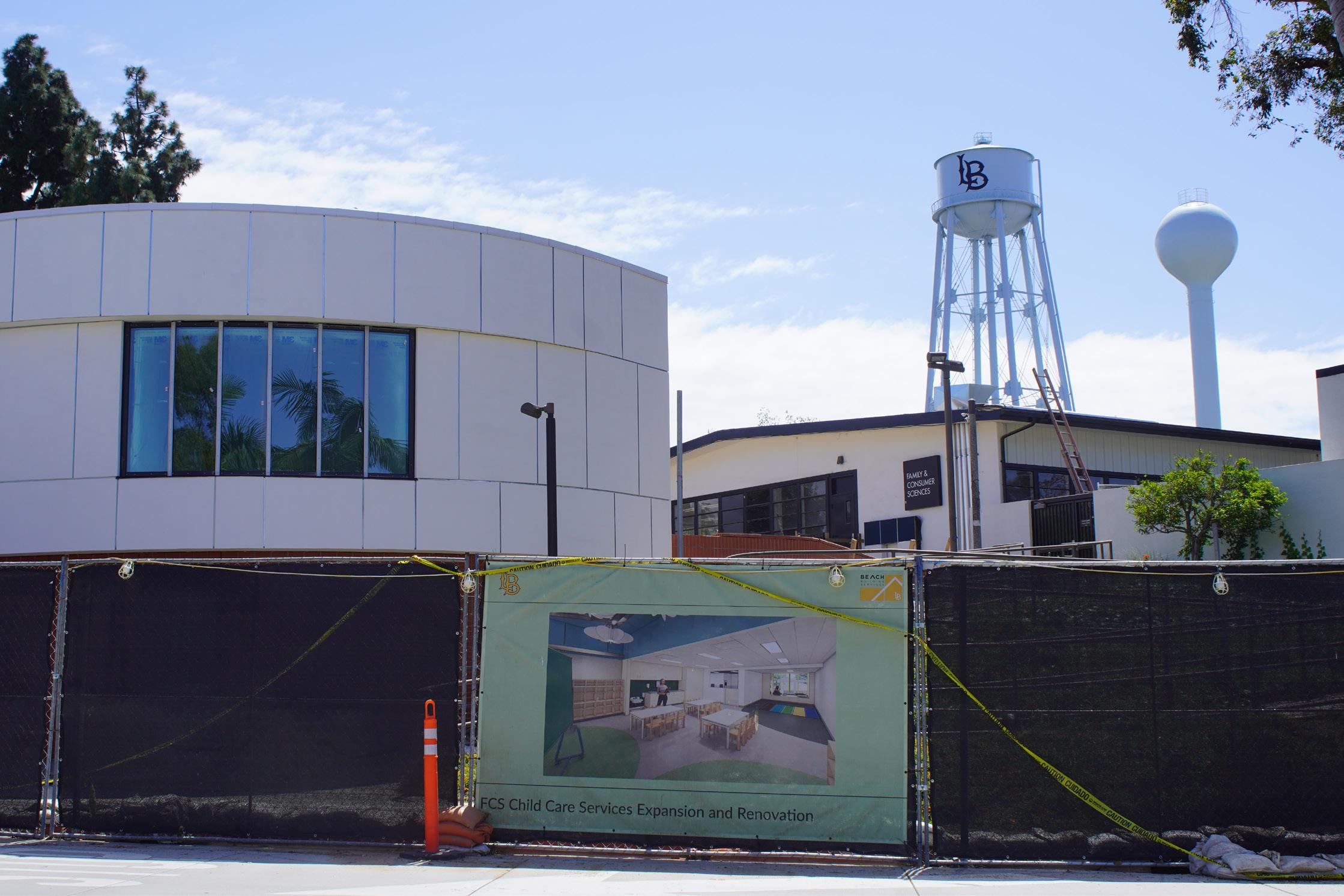
Photo credit: RENZO POCASANGRE/Long Beach Current
Relocation efforts were made by program administrators to continue childcare operations but were hindered due to strict licensing requirements back in 2023.
a space for CSULB employees who are parents or caregivers to find childcare resources, ask questions and share input and ideas that could be helpful to others, in late spring of 2024.
Professor and Department Chair of the Women’s, Gender & Sexuality Studies department Lori Baralt expressed the difficulty of finding on-campus resources for faculty-parents and caregivers as these resources tend to be spread through word of mouth.
“I’m hoping that this is a way that parents— all caregiving faculty— can connect and have a network, and have just resources in one place. Because all of us were saying that’s something we would have liked to have,” Baralt, who also serves as the BEAPAC secretary, said.
The CFC renovation project will bring an array of new program features beyond the new building addition, including a covered play area, toddler
classrooms, a staff room with supporting functions and an overall larger accommodation capacity.
Additionally, the renovated facility will help increase the number of graduates whose training will allow them to improve the quality and availability of childcare programs post-graduation.
“We will be welcoming student-parent families for the first time upon completion of this $12 million renovation. We plan to open doors of the re-imagined Center in the 2025/2026 academic year,” Department Chair of Family and Consumer Sciences Virginia Gray said in an online statement.
Before its closure, the CFC program had a limited child capacity, and many parents found themselves on a waitlist before enrollment as the on-campus convenience, below-market price cost and unique program features made the program competitive.
“I understand we all need childcare
so that they can be students and so we can be professors, faculty and staff,” Baralt said. “I am curious how they’re going to balance that.
According to Beach Building Services, this renovation will expand the childcare and teaching facilities to “yield a significant increase in the quantity and range of childcare services available for children of students attending college.”
Despite the new program changes, many hope the culture of the program remains once the facility reopens. Many of the program’s lead teachers graduated from the department of Family and Consumer Sciences’ own early childhood education master’s program, showcasing the strength of the department.
“If we can have the same culture that we had before, with caring and experienced teachers— educated teachers, and obviously, if it’s in a nice building, that’s great,” Behzad said. “But really, the priority is the level of care.”
Grant revocations have hit 20 campuses, totaling a loss of $65 million.
BY LINSEY TOWLES Managing Editor
Since January, five federal agencies have revoked eight grants at Long Beach State, adding to over 60 terminations across the CSU system in a move university officials have called “an attack on higher education.”
These grant terminations come from five federal agencies:
• 3 revocations from the National Endowment for the Humanities
2 revocations from the National Institute of Health
• 1 revocation from the Department of Education
• 1 revocation from the Department of Transportation
• 1 revocation from the National Science Foundation
“It’s the most fluid situation I’ve ever seen,” Barbara Taylor, interim associate vice president for research and sponsored programs at CSULB, said. “It’s just such a kick in the gut. The faculty for whom this has happened to have had that knock the wind out of you sort of feeling.”
When a grant is won, it is awarded to the CSULB Research Foundation and funneled to grant recipients to promote research, scholarly or creative activity. A grant can come from various sources, including federal and state agencies, or private groups and individuals.
According to Taylor, grants are usually terminated under extreme circumstances, like fraud or mishandling of funds. However, the reasons provided by the federal agencies that have revoked grants at CSULB remain vague.
“The most common reason is words to the effect of ‘the project no longer

Graphic credit: LINSEY TOWLES/Long Beach Current Long Beach State has experienced eight terminations from five different federal agencies, as well as three pauses in grants.
aligns with the agency’s priorities,’” Taylor said.
CSULB President Jane Close Conoley said the recent grant terminations have been disappointing but not surprising.
“These grants tend to look into the human condition,” Conoley said. “Higher education tends to ask questions. There seems to be a new narrative from the Republican regime that there’s only one way to think.”
Many university officials have pointed to recent federal government actions, such as international student visa cancellations and the freezing of federal funds and grants, as a concerted effort against higher education institutions.
“I think it’s a war on higher educa-
tion,” Taylor said. “This is one front on which that battle is being fought. The visa cancellations are another. Some of these might not seem like a big war on education, but every bit counts.”
According to data provided by Taylor, there have been 62 grant terminations across 20 CSU campuses.
These terminations come from federal agencies, totaling a loss of $65 million across the CSU system.
The National Institute of Health has the highest number of grant cancellations, at 20. The National Endowment for the Humanities has the second-highest number, at 11, and the Department of Education has the third-highest number, at 7.
Three grants from the U.S. Department of Agriculture have also been paused. These terminations have cost a total of $2.1 million.
According to Taylor, these grants were cancelled at various stages of completion, with one project very close to its end. Taylor also described notification of these cancellations as “haphazard,” with instances of emails and letters being sent to the wrong people or from unofficial government emails.
Both Taylor and Conoley confirmed many of these grant terminations have been taken to court alongside other schools in the CSU system and across California.
The university was able to provide funds to students who lost grant support in the College of Science and Mathematics, but has been unable to fund other losses, according to Conoley.
“We are cooperating with legal cases and partnering with the state attorney general,” Conoley said. “The only right thing from my perspective is that faculty members get their money back. They wrote their proposal and they should be allowed to finish their research.”
Taylor said university officials are bracing for more grant terminations, staying prepared on behalf of faculty and ready to bring cases to court.
Since grant terminations began in January 2025, CSULB has been awarded 13 grants, totaling $1.9 million. Currently, the university has 143 active federal grants totaling $86.5 million and 121 active non-federal grants totaling $56.5 million.
CSULB ranks ninth in the CSU system in the number of grant terminations.

BY JUAN CALVILLO News Editor
Various colleges across Long Beach State are preparing new coursework, collaborations, name changes and program unifications for students to take advantage of, just in time for the 2025-26 academic year.
Classics and Comparative World Literature are two programs under the College of Liberal Arts’ umbrella. According to the program’s website, Classics focuses “primarily on the cultures of the ancient Mediterranean,”
while CWL focuses on “world literatures in translation and the relationships among those literatures.”
CLA Associate Dean Donna Nicol said these programs, which were once combined under one department, have already had their proposal for unification approved by the Academic Senate.
She said the decision to unite the programs, led by faculty in both programs, started last year, and the goal is to preserve both courses and faculty.
According to Nicol, the joint programs are focused on preserving students’ access, especially given the state budget cuts.
Another change in the CLA this coming fall is the Department of International Studies becoming the Department of Global Studies. Nicol said the change is curricular, rooted in the department’s desire to stay up-to-date in its field.
She said the college has put a premium on offering students variety. In the case of combining two programs like Classics and CWL, the idea is about bringing resources together.
“So yeah, that’s really it. That we’re trying to make sure our students have more options than less,” Nicol said. “But given what we’re going through, we might have to just be a little bit more strategic about it.”
COB Associate Dean Sabine Reddy, said the college’s degree in Accountancy will be part of the new Beach Expedited Degrees in Graduate Education program. This program merges the bachelor’s and master’s degree programs of some disciplines across CSULB.
According to the program’s website, it “will double count as a specified number of units (no more than 12) in both programs so you can earn your graduate degree faster and with less cost.”
Reddy said the program is designed to have students graduate in five years.
“So it’s really, basically trying to accelerate people through the graduate program,” Reddy said.
She added that two of the undergraduate electives can be substituted with classes in the graduate program to expedite things. The idea is to save some units for students in the program.
The College of Business, Continuing Education and Liberal Arts departments all have changes anticipated in the upcoming academic year.
The website notes only students who fulfill the following can apply for the program:
Students who are matriculated undergraduate students at CSULB
• Students who completed 60 units
• Students who are enrolled or have completed 12 discipline-specific upper-division units at Long Beach State
Education
CPACE Senior Director of Marketing and Enrollment Management, Ashleigh Willis, said CPACE will offer an online bachelor’s in Criminology and Criminal Justice this coming fall, in partnership with the College of Health and Human Services.
The online program is directed towards transfer students at different stages of life.
CPACE continues to look for opportunities to partner with other colleges on campus to better address multiple types of learners and their interests.
“Lifelong learning is essential, so we’re focused on helping students from many different backgrounds to grow in their professional careers and thrive in their busy personal lives,” CPACE Associate Dean Alysa Turkowitz said in an email to the Current.
BY KHOURY WILLIAMS
Copy Editor
Her eyes lit up, and a smile brightened her face as she recounted stories of writing books with her husband, watching her children grow and the many joys of family life.
These are simple reminders that she finds the most happiness in being with family, despite the pressures of leading a university as president.
“Maybe there’s something else I could be doing,” Long Beach State President Jane Close Conoley said. “Why not use some time in my life to spend time with my family, spend time with my grandkids?”
Conoley will turn 78 on May 31, and come June, she will be retiring after 11 years as president of CSULB and 50 years working in education.
As a wife, mother of three children and grandmother of five, she cites her family as the most significant reason why now is the perfect time to retire.
Fourth District Councilman Daryl Supernaw said in an email statement to the Current that he thanks Conoley for her community work beyond the university.
“[Her] caring, hands-on leadership style will be missed, and we wish her the very best in retirement,” Supernaw said.
After retirement, Conoley plans to move to San Francisco and live in a multigenerational house with her husband, Collie Conoley and her youngest son, Collin Conoley.
Conoley obtained her psychology doctorate from the University of Texas at Austin, where she met her husband.
Her career accolades include the Associate Dean of Research at the University of Nebraska, Dean and psychology professor at Texas A&M University, Interim Chancellor at the University of California, Riverside and Dean and psychology professor at the University of California, Santa Cruz.
In 2014, Conoley became CSULB’s first female president and the university’s 12th president overall.
Under Conoley’s leadership over the past 11 years, the university has achieved significant milestones in access, equity and student success, including the No Barriers Campaign, Basic Needs Program, Beach Pluralism, increased graduation rate and hiring more diverse staff.
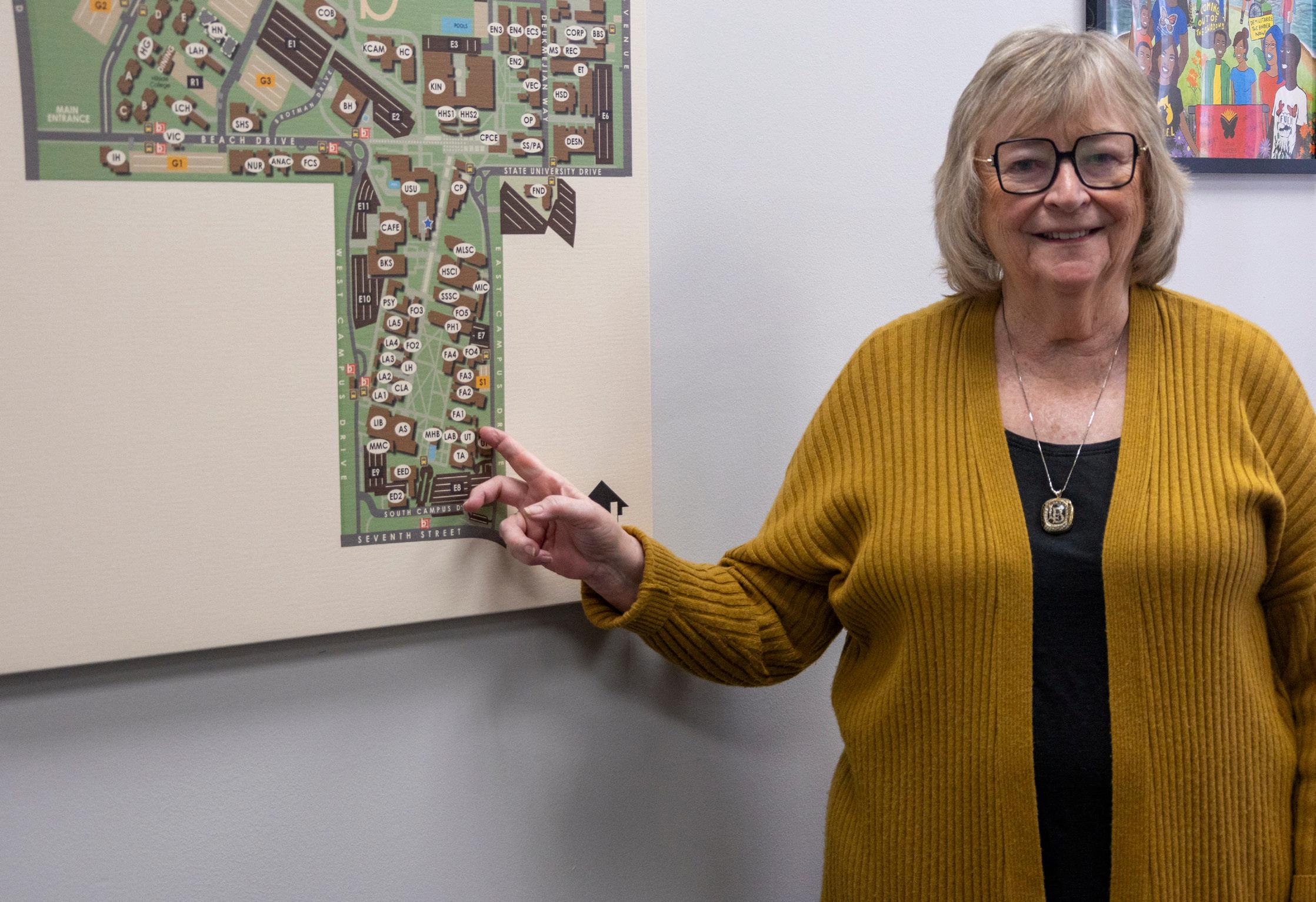
As a strong advocate for diversity, equity, inclusion and accessibility initiatives, Conoley said one of her proudest achievements was forming an equity hiring team that looked beyond biases and impressive accolades to give new hires with fewer achievements and good character a platform to thrive.
Conoley is no stranger to controversy herself. As the public-facing figure representing CSULB, she faces blame and criticism for university-wide decisions and decisions across all California State Universities, including the Time, Place and Manner policy.
“I think [criticism] is unavoidable. If I do things, I can be criticized, and if I don’t do things, I can be criticized…,” she said. “I know there are righteous frustrations with costs, facilities, our external political environment and so on. I don’t often have the power to do what students and others may want.”
She added that most funding for
CSULB comes from state legislature, which primarily concerns tuition costs and facility upgrades.
Associated Students Inc. Vice President of Finance Andre Achacon has regularly met with Conoley and ASI’s executive cabinet members to discuss initiatives concerning the university.
While Achacon said there were moments where Conoley and her office did not respond to particular campus-related concerns as best as they could have, he recognizes the tough position she’s often placed in and appreciates her overall support for ASI and the student body.
“President Conoley has been a really great partner in so many ways,” Achacon said. “Whenever [there are] challenges, she’s usually the one to make sure we overcome those challenges.”
As the search for her successor continues, Conoley said she will ensure they know the wonders and possibilities CSULB can offer once they are in office.
“I’ll be telling the next president that they’ve earned a really great spot here; you have a jewel here,” she said. “It’s under scrutiny, it’s under assault in some ways from the federal level, but I think our local community, our alums, I find them very supportive.”
To Conoley, the community is what makes the university great. She said it takes a team effort and credits the leadership of administrators, deans, department chairs, faculty, staff and students for making CSULB what it is today.
She recognizes how challenging navigating life as a college student can be, but urges them to persevere through obstacles to create their desired futures.
“For our students, I want to remind them that they’re great. We have a lot of evidence about that. Most of our students are juggling work, school and personal lives,” Conoley said. “I would tell them to stick it out. Stick to their dreams. It’s going to be worth it.”
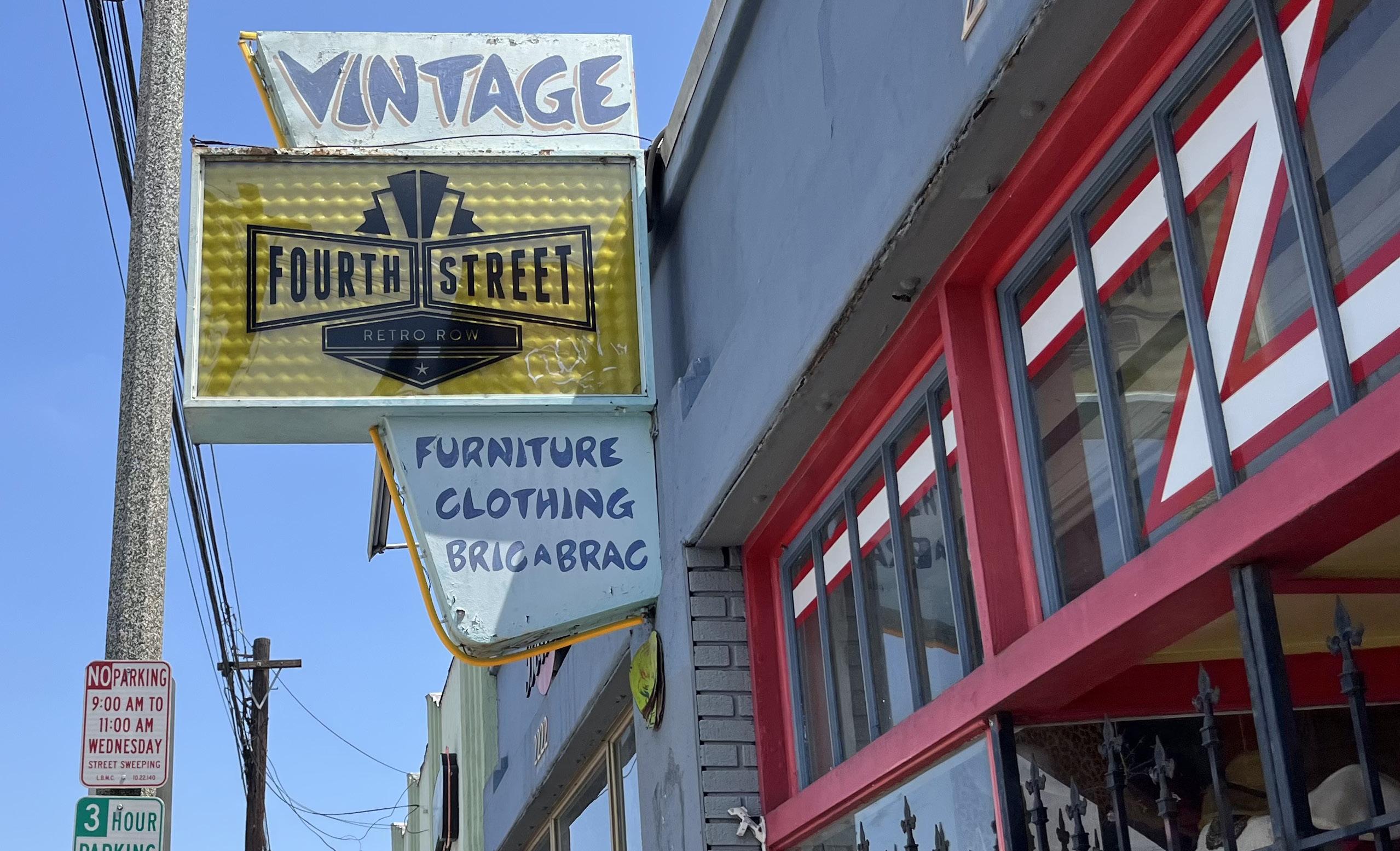
BY GRACE LAWSON Arts & Life Assistant
Unique locally owned shops, an array of entertainment options, plenty of fun foodie spots and all just minutes from the waterfront.
Long Beach didn’t garner its reputation as a meet-up mecca for nothing.
Boasting colorful pockets of hang spots, the 127-year old shoreside city offers plenty for day trip visitors.
With graduation season here, visiting friends and family of Long Beach State graduates who find themselves with some time to kill and nowhere to go can now relax. Read on and explore three of the most memorable local spots favored by students and locals alike.
Distance: 3.4 miles from campus or a 13-minute drive
Also recognizable by its other
popular namesake, Retro Row, Fourth Street in Long Beach is known for its diverse shopping options and unique restaurants. Brunch and coffee spots are aplenty in this street, including The Breakfast Bar, Good Day Cafe and Coffee Drunk.
For those looking for lunch or dinner, restaurants like Lola’s, Aji Peruvian and The Social List are known for their unique menus and modern takes on traditional dishes.
Visitors looking for stores and shops that fit the “retro” aesthetic of the street’s namesake should start their searches at Cool Cat Collective, Goldie’s, Third Eye Records and Starday Vintage. With stores offering clothes and knickknacks from every decade running the length of the block, Fourth Street can be seen as a vintage lover’s dream.
For entertainment, Retro Row is also the location of the Long Beach Art Theater. First opened in 1924, the one screen theater is over 100 years old and still a vibrant revival theater playing older and newer films.
All locations are within walking distance of one another.
With visitors given the length of the street to explore the wide array of vibrant and unique storefronts, visitors looking for a nice and exciting stroll
should check this spot out.
Distance: 3.6 miles or a 16-minute drive from campus
From bars to restaurants, to athletic clubs to thrift stores, there is no shortage of offerings to a day (or night) spent on Belmont Shore’s Second Street.
Grab a morning coffee from a place like Philz Coffee or Colossus Bread, named one of the best bakeries in Los Angeles by The Eater Editors, and a quick lunch or dinner at The Win-dow burger restaurant. One also cannot forget to enjoy the bustling bars and nightlife. There is no limit to the explorations of an open schedule and time to spend on Second Street.
Those looking for a fuller meal have plenty to choose from.
There are many Mediterranean offerings like Nick the Greek, to Open Sesame Grill, George’s Greek Cafe and Domenico’s Italian restaurant to a more casual upscale celebratory night out setting like Saint and Second or Nick’s
Restaurant on 2nd. Any appetite can be catered to.
Distance: 5.3 miles or a 16-minute drive from campus
Built inside a reconstructed aviation hangar where military and commercial planes were once constructed on site, The Hangar has been repurposed into a space that hosts 14 unique vendors offering curios visitors everything from food to boutiques.
Apart from the regular vendors, the hanger’s outside area plays hosts to markets and pop-up events including the 4th Friday Night Market from 4 p.m. to 8 p.m. and the Sunday Funday Market from noon to 6 p.m.
The Hangar features a large outdoor seating area perfect for large groups.
Right across from the Hangar also within the LBX space are more shopping opportunities like an Ulta and Nordstrom Rack, as well as other food and dessert spots like Silverlake Ramen, Chocolate Bash and a Handel’s Ice Cream.
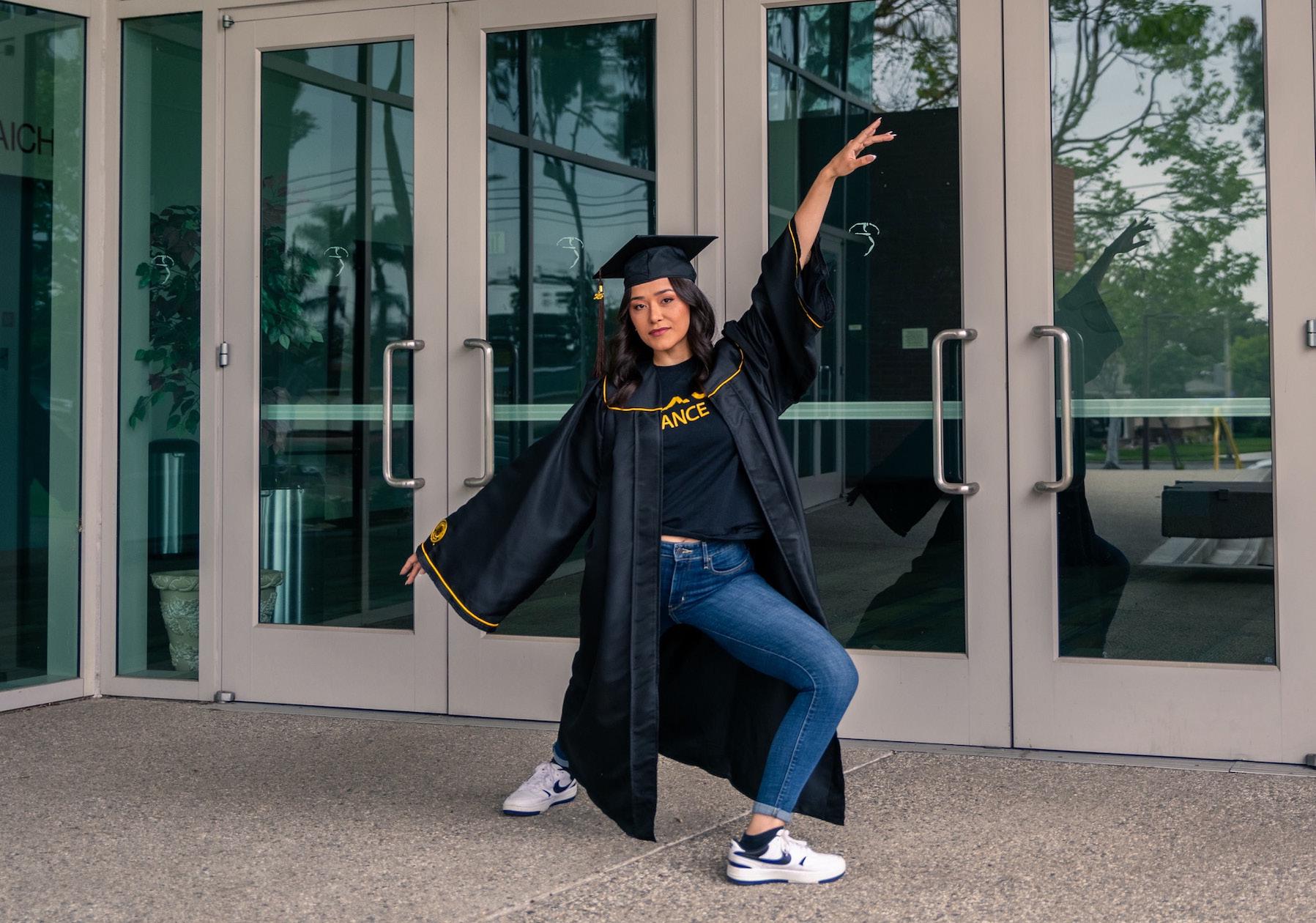
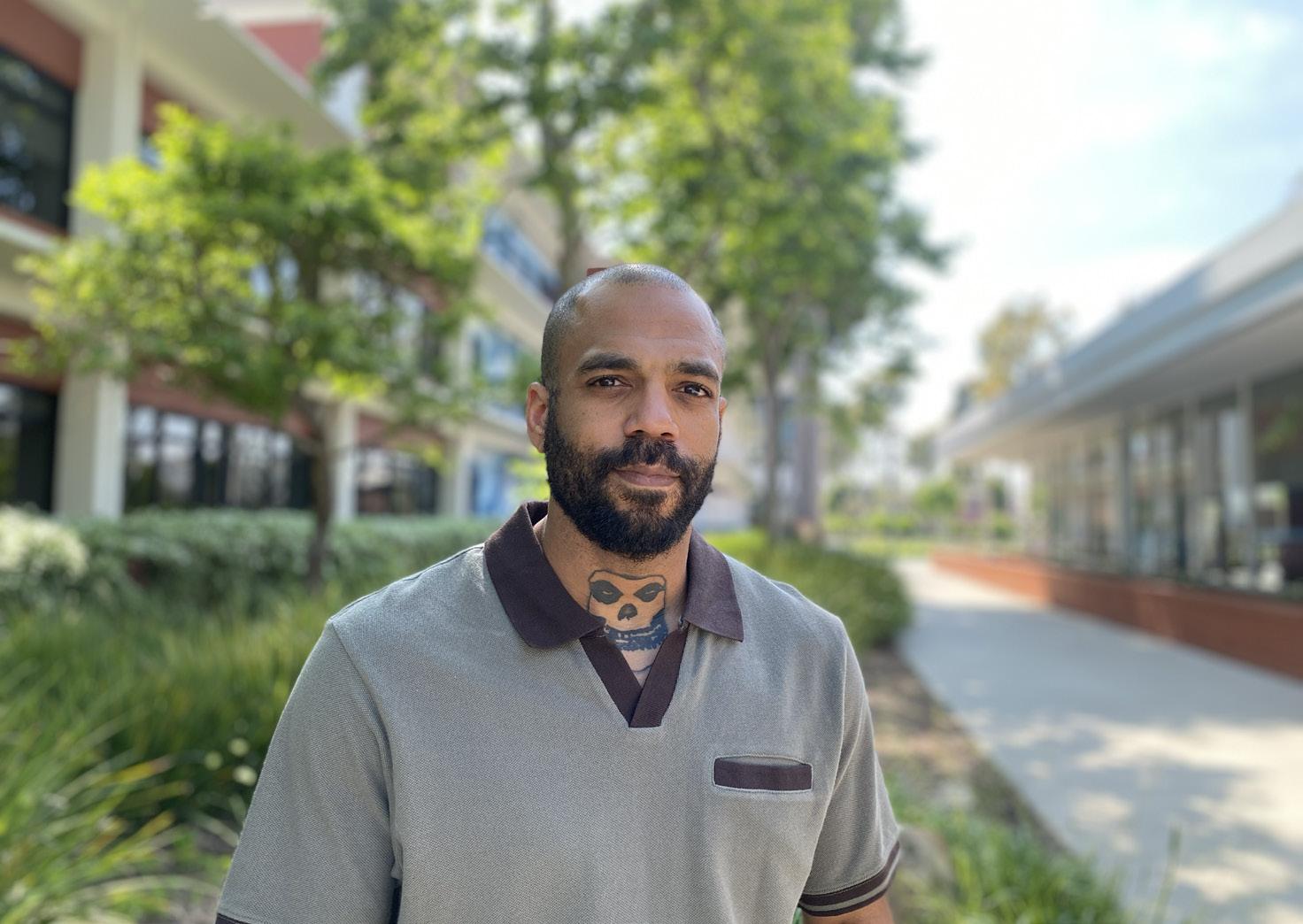
Photo credit: JULIA
Beach Current Before the Social Sciences & Public Affairs building stands 37-year-old Marc Jackson,
BY ELIZABETH CARROLL
Contributor
Commencement is right around the corner for the Long Beach State class of 2025.
As students prepare to walk across the stage at Angel Stadium to receive the degrees they have worked tirelessly for, the question now arises of what they will do next.
With 99 undergraduate degrees and 66 degree options offered from the university’s graduate catalog, along with numerous graduate and doctoral programs, students’ degrees and lives after graduation vary.
For Marc Jackson, 37, the completion of his bachelor’s in political science this May is a milestone he could’ve never imagined.
Right out of high school in 2005, a younger Jackson joined the United States Marine Corps.
Following in his father’s footsteps and joining the “family business,” Jackson intended to finish his four-year term until a personal injury quickly ended his time in the armed forces.
“My career was cut short after I had a seizure,” Jackson said. “It was my first real job, things were going really well. Then, all of a sudden, just ‘Bam,’ it felt like it was taken from [me.]”
Outside of the military, Jackson recounted falling on hard times - dealing with homelessness, substance use and drug dealing, until he eventually received a two year prison sentence in 2018.
As a short-term, first-time offender, Jackson was then unexpectedly released from prison when the COVID-19 pandemic began to break out within the prison walls.
Not long after his release, Jackson received an email from the United States Department of Veteran Affairs, alerting veterans of opportunities to further their education through financial aid.
“I got lucky because the flyer was 70 pages long about the program, and 60 of it was all different schools that were accepting this program,” Jackson said. “‘What are the odds that Long Beach is going to have it or anything out here,’ you know? I scroll down and like page 50 - Long Beach City College.”
Seizing the opportunity, Jackson completed his associate’s degree through LBCC before transferring into the political science program at CSULB, where he took a specific interest in government and the Supreme Court.
After graduation in May, he will be continuing on to CSULB’s Masters of Public Administration program, to further personal development for future managerial positions.
Jordan Guevara, 23, is walking across the stage with both a degree in hand and a job in his pocket.
Receiving his bachelor’s in business administration with an emphasis in finance, Guevara is currently employed as an individual securities analyst at Califano Financial Group.
“I was fascinated by the idea that I could literally make money from pressing buttons on the computer,” Guevara said. “I wasn’t sure what exactly I wanted to do, I just knew I wanted something in finance.”
Originally studying at the University of California, Santa Barbara, Guevara transferred to CSULB during the fall 2023 semester.
Since his arrival at the Beach, Guevara has utilized resources within the department, like the student-run Beach Investment Group. The experience, he said, has helped further his knowledge on finances and assisted him in gaining experience for his job.
“The school has an endowment [that] they allocate a small portion of to this fund that students manage so that we can get real world experience in managing a portfolio,” Guevara said. “I think we manage around $1.6 million on behalf of the school.”
Currently working part-time in a small office with room to grow, Guevara hopes to go full-time working toward becoming a financial advisor for the firm.
The job would entail taking on personal clients, giving investment advice and eventually opening his own practice.
“It’s a ton of experience that some-
one at my age would not typically be able to get,” Guevara said.
Olivia Leyva, 24, hopes to combine her love for teaching and dance into one after receiving her bachelor of arts in dance.
Originally a child development major due to her love for kids and teaching, Leyva found herself dreaming in class of dancing and following her passion.
“I loved what I learned, but it wasn’t right for me,” Leyva said. “I was sitting there in classes thinking, ‘I would rather be dancing.’”
Self-described as shy at heart, Leyva found a way to teach and interact with others through dancing, after her own teachers pushed her to work toward what she loved.
Transferring to CSULB from her home city of San Diego, Leyva switched her major to dance after seeing the “diverse” program the university has to offer.
“Usually they’re focused on modern and ballet, and that technical aspect,” Levya said. “Long Beach just has everything.”
With auditions had and jobs lined up for her future, Leyva plans on making the most of her degree by experiencing all that performing has to offer her.
Ultimately, she plans on continuing to teach to the younger demographic, receiving the same help she once needed as a child, with dreams of opening her own studio.
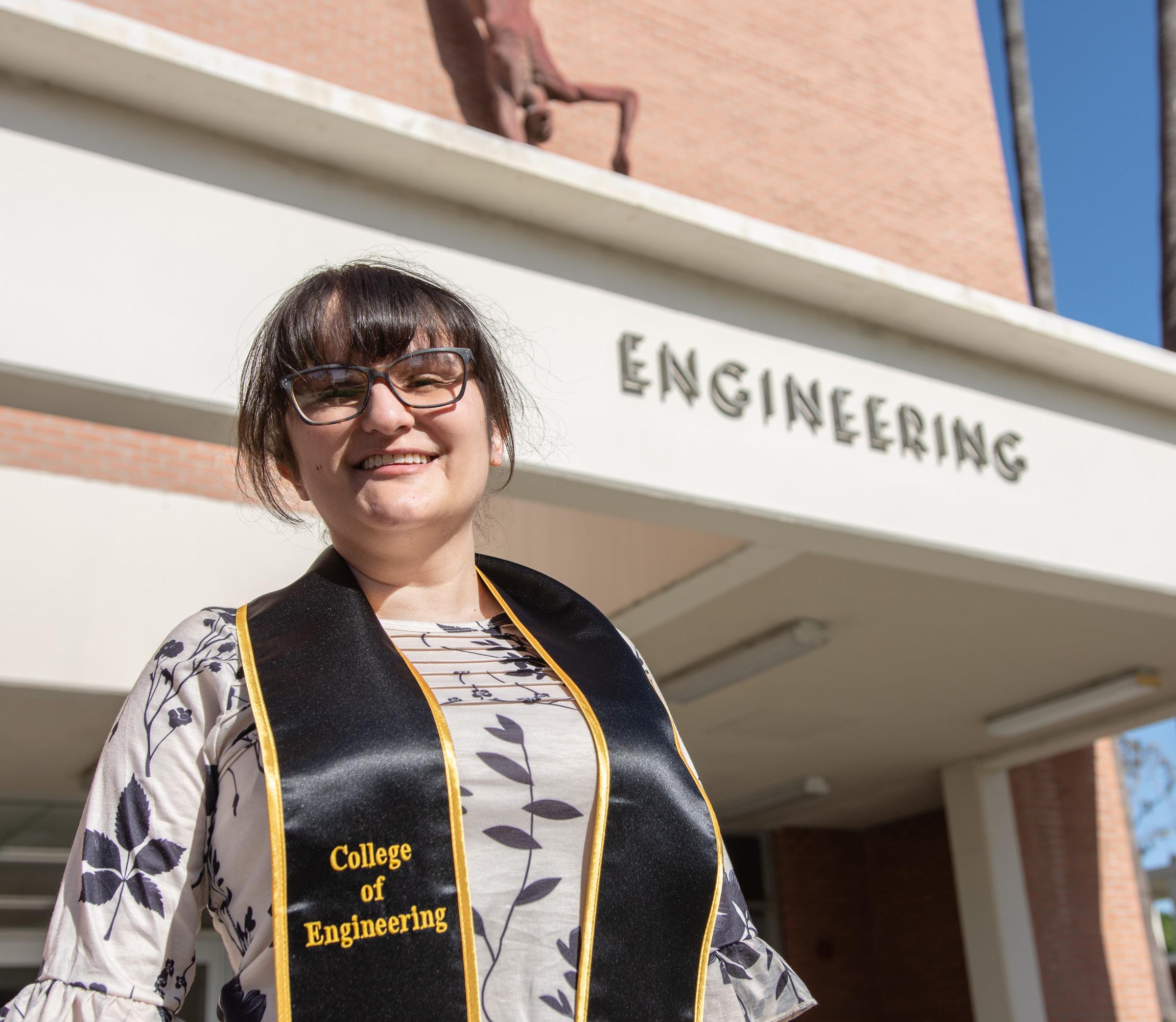

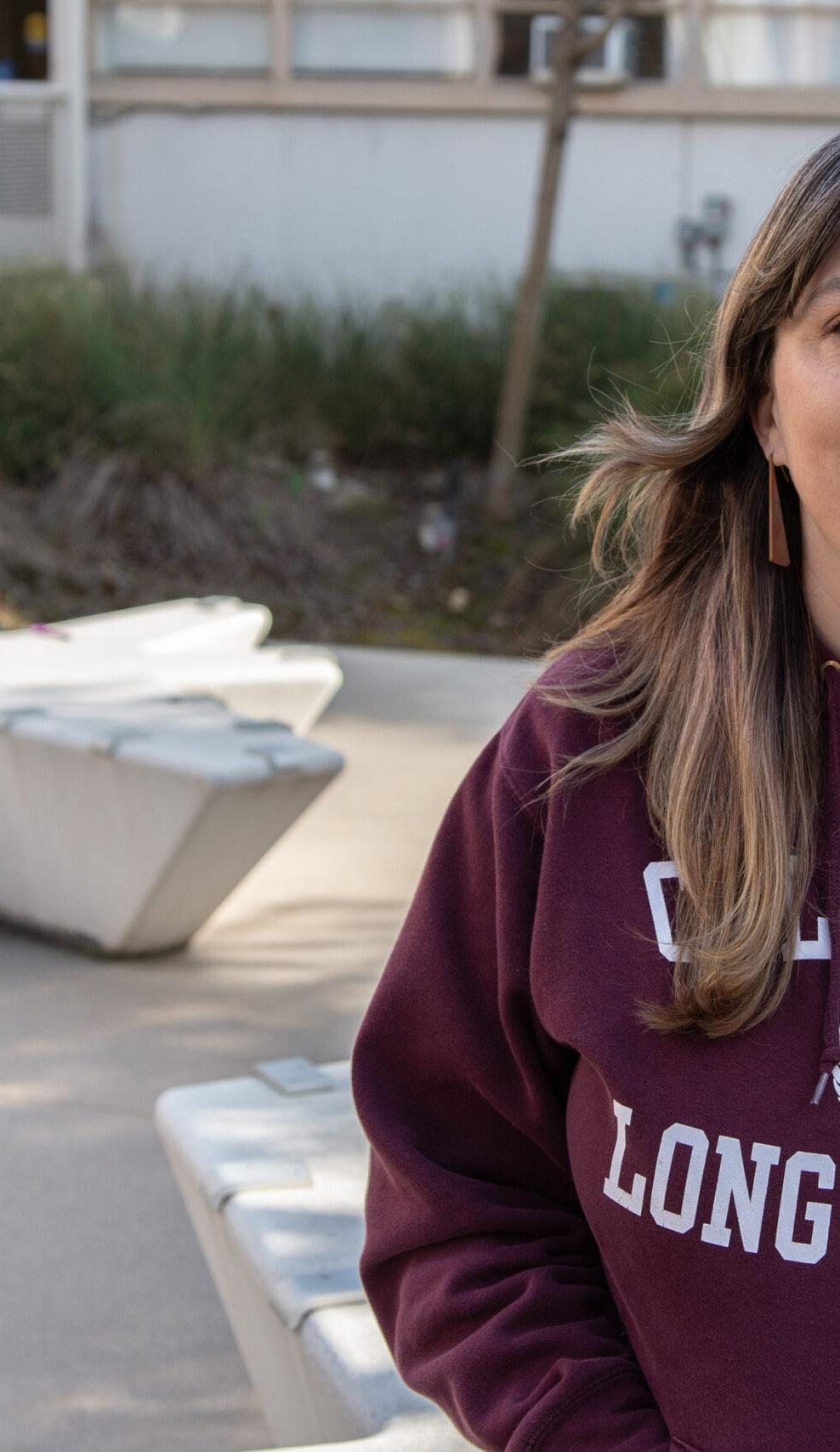
BY BELLA GARCIA
Copy Assistant
Among a sea of nearly 10,000 spring 2025 graduates at Long Beach State, there is a quiet presence turning heads, not for how quickly they got to the stage, but for how far they have come.
This presence indicates a growing national trend of non-traditional students returning to the classroom, fueled by an invigorated sense of purpose.
Among them is 32-year-old Alma Villaescusa Pineda, earning her bachelor’s degree in computer engineering, a path she never imagined possible a decade ago.
After immigrating from Mexico at age nine, Pineda pursued psychology and began a career in therapy and psychiatry. However, once the COVID-19 pandemic hit, Pineda was laid off.
Looking at which careers would help her earn more than her former $18 hourly wage, Pineda’s boyfriend encouraged her to return to school— this time, for a STEM degree.
This new path, however, brought challenges for Pineda; she faced obstacles in her coursework and skepticism from her family.
“[They would] say at the beginning, ‘Are you sure? Science? Math? You were never really good at those,’” Pineda said.
Despite often being the only woman in the room, Pineda said she found support through a group of classmates and her partner. Additionally, her coursework began to click, citing a positive experience in a programming class.
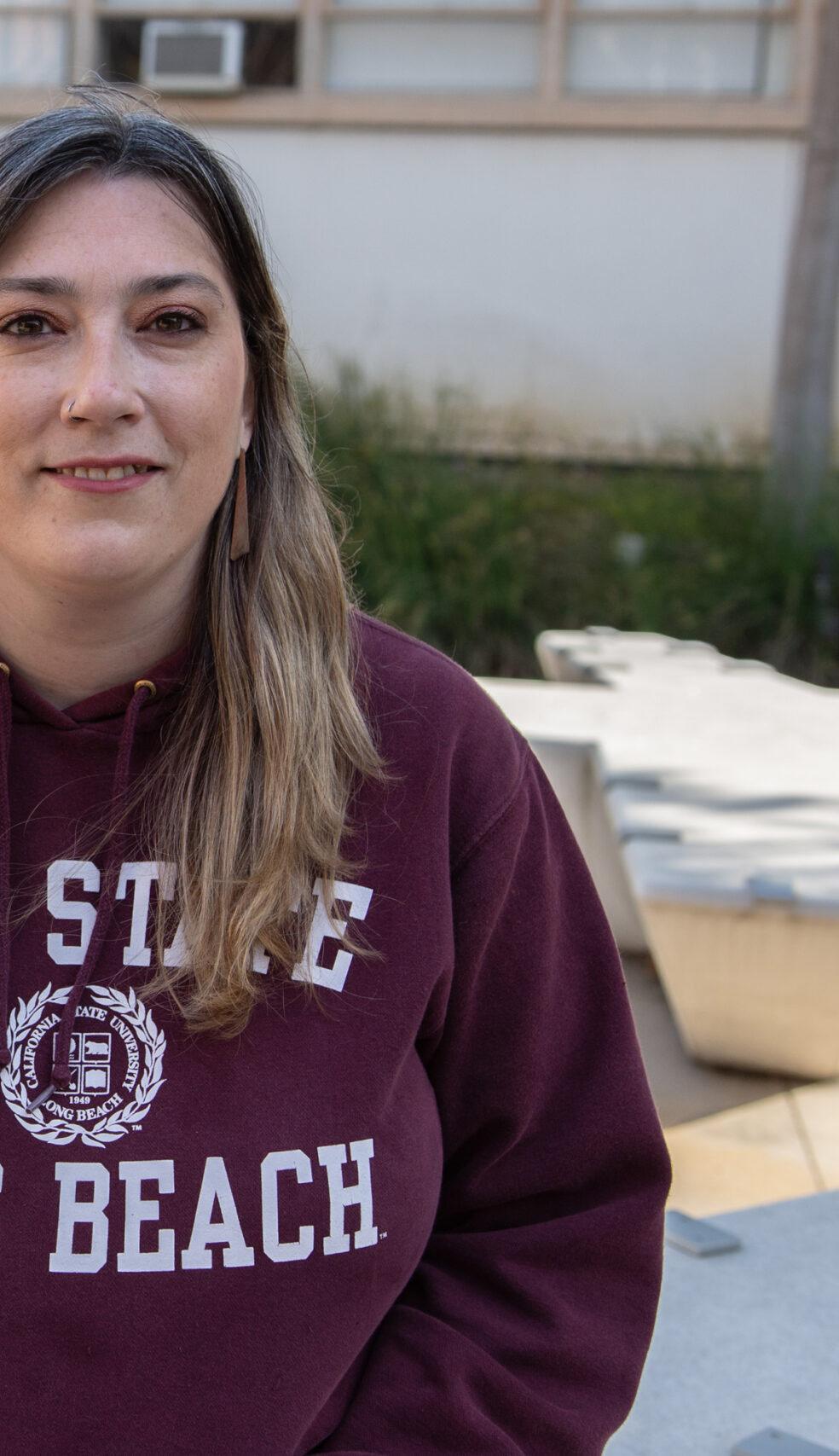
“Just give yourself the grace to be gentle with yourself, to know your limits, accept your limits and move forward from there and ask for help,” she said.
For Quinn Bentley, 34, his journey in education differs. Self-described as functionally illiterate until the age of 19, to now graduating as an Associated Students, Inc. Senator with a 4.0 GPA, Bentley receives a master’s in business administration this May.
“I had a 1.8 GPA in high school, I never planned on going to college,” Bentley said. “The plan was always going to the workforce.”
After a decade working in special education, Bentley stepped away when a move from Seattle to California made it financially unsustainable.
Becoming a father brought new clarity and a new set of decisions for Bentley, pushing him to return to graduate school.
“Part of it was wanting to live up to the picture I presented to her when we got married,” Bentley said. “Part of it was family. And part of it was just being the man I promised I would be.” Bentley’s experience at CSULB, however, has not been without adversity; he recounts almost dropping out when his friend died of an accidental drug overdose.
“His name was Jordan Mueller, and this was very devastating,” Bentley said. “I even thought about dropping out for a little bit, but I just didn’t think that would be a good way to honor his life.”
Bentley transformed his sorrow into action while working on “Jordan’s Resolution,” calling for a billion dollars in additional federal spending for treatment facilities, research, overdose reversal medications and anything to support
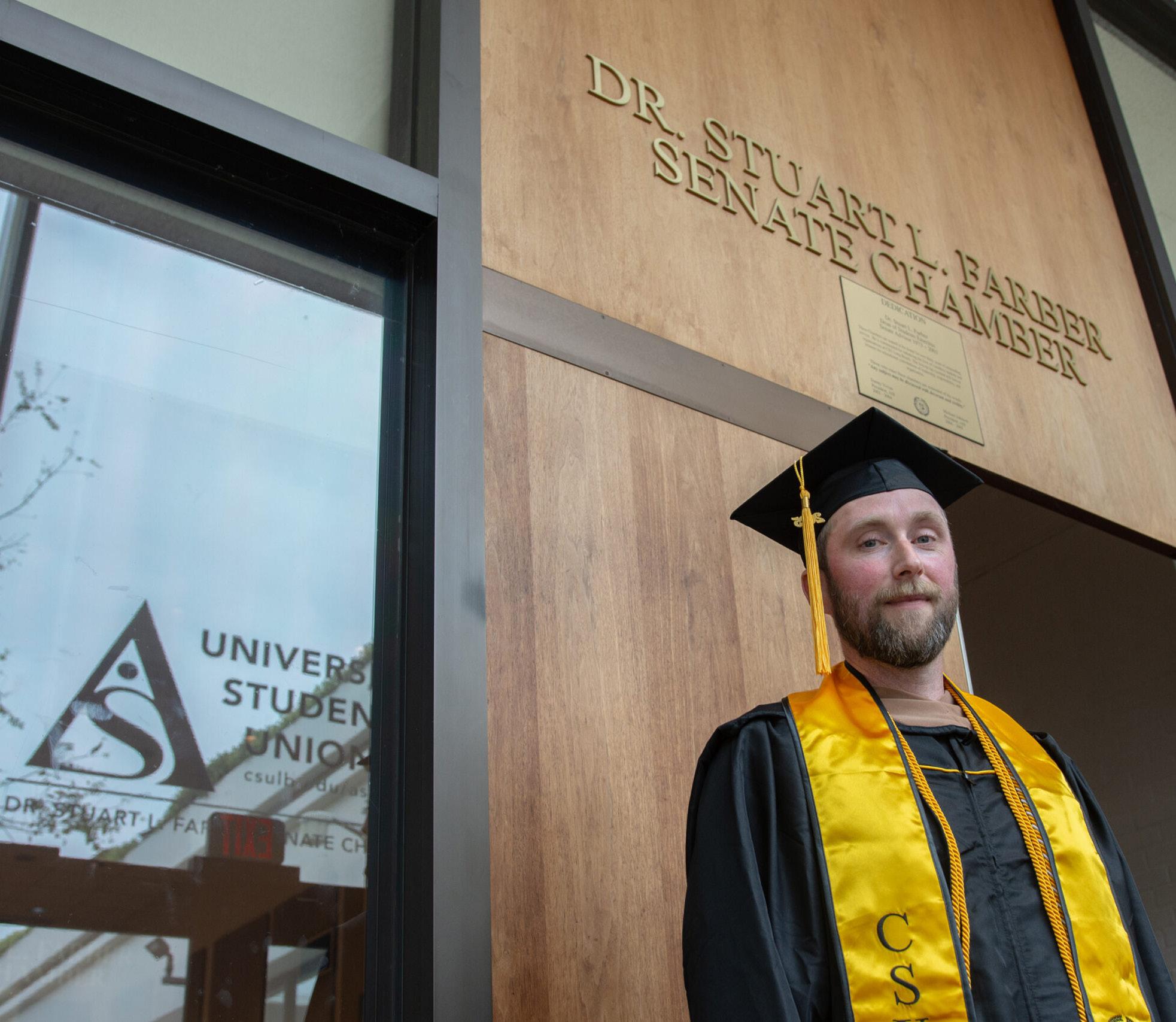
the community.
Leading up to the big moment, Bentley expresses pride.
“I know that because I’m getting this, it’s going to substantially change my kid’s lives,” Bentley said. “I’m very happy about that.”
Pride also runs high for 38-year-old Krystal Mead this spring, as her autodidactic decision to return to school sees its fruition through her bachelor’s in sociology.
“I can hardly think about it without crying,” Mead said. “I’m here on a sacrifice. I’m here very intentionally.”
Though college was something Mead always dreamed of, she said circumstances like poverty, childhood abuse, neglect and her parents’ refusal to share necessary social information to qualify for FAFSA benefits prevented her from that path sooner.
“That was really one of the first times [I experienced] the social stigmas and systems that are set up deliberately to disadvantage some people,” Mead said.
Estranged from her own parents, who walked out on her high school graduation, Mead will be accompanied on her graduation day by her husband’s family, “her chosen family.”
“They’re all incredibly proud of me,” Mead said. “We’re gonna throw a huge party, and it’s just not only a redo, but, you know, it’s been such a long time coming.”
With plans to attend law school after completing her degree, Mead seeks to fight the very systems that failed her by advocating for civil liberties and justice.
“I don’t expect to change any systems on my own,” Mead said. “But I want to be part of the team fight. I want to look back and say I tried.”
left: Alma Villaescusa Pineda received her bachelor’s degree in psychology in 2016. She came to Long Beach State to earn a second bachelor’s degree in computer engineering and will be graduating this month. Krystal Mead, 38, is a first-generation college student graduating from Long Beach State with a bachelor’s degree in sociology this month. Mead relied on the Student Success Center to support her in her education journey. Quinn Bentley is a father of two and worked with special education students in public schools for a decade before attending Long Beach State to earn his master’s degree. Bentley will be graduating with a master’s in business administration this month.
Beach Current
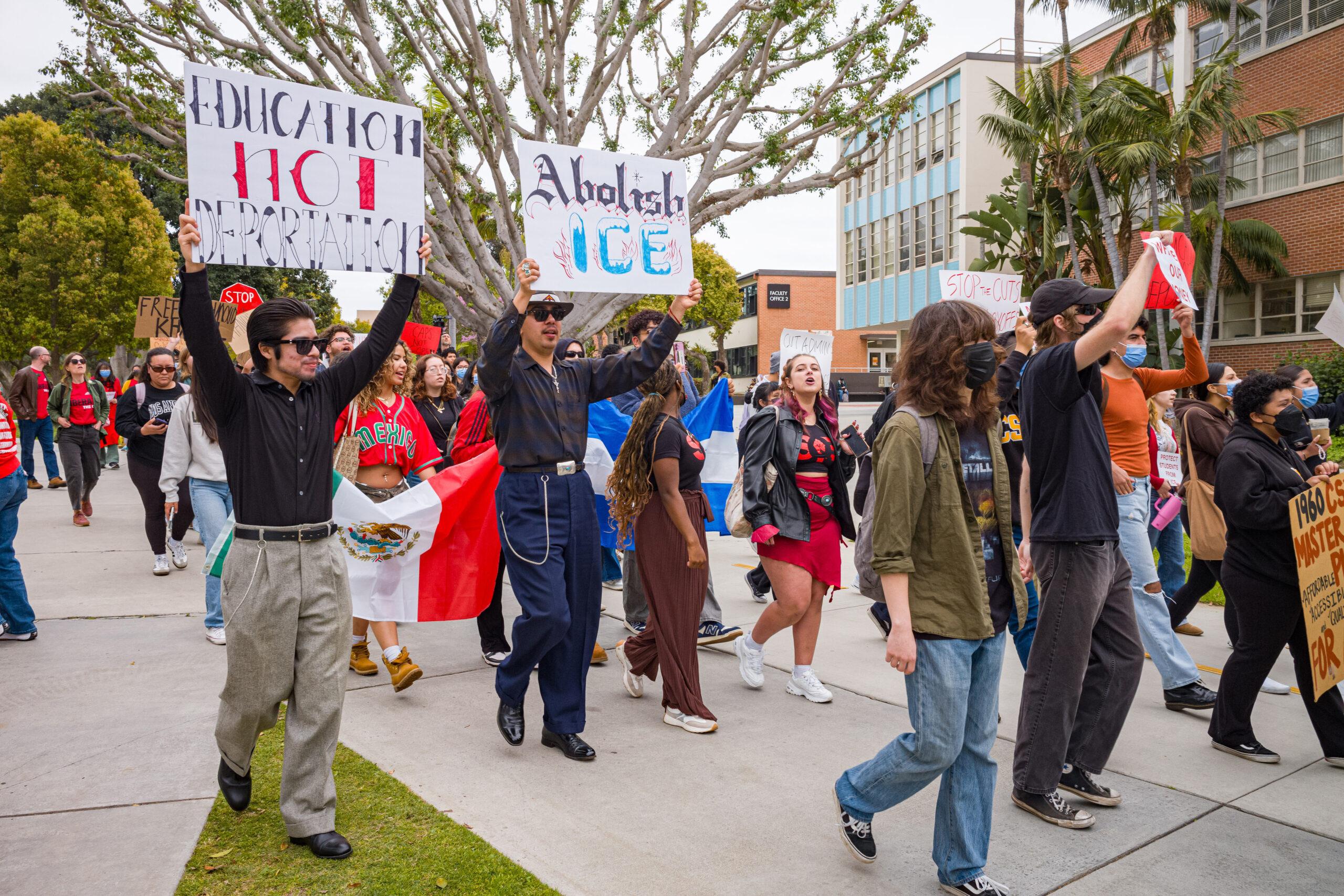
President Donald Trump threatens to slash university funding, terminate student visas and arrest students for participating in “illegal protests.”
BY SAM FARFÁN Community Engagement Editor
Frozen federal grants, reversed DEI policies and sudden student deportations are a few of the damaging changes to higher education since the start of President Donald Trump’s administration earlier this year.
In the first 100 days of his second term, Trump’s most aggressive attack on our Long Beach State student body has been our international students’ abrupt visa terminations just in the past month alone.
Earlier last month, the Current reported that six CSULB international students had their visas revoked within one single week, confirmed by university President Jane Close Conoley. This included a student who was deported to Tokyo, Japan from an airport in Honolulu after flying back from
spring break.
Initially, university administrators stated there were no clear reasons for the visa revocations and “were seemingly chosen at random, with no connecting factors between them.”
In a following Current article, university officials were told one of the students had their visa terminated because of an unpaid parking ticket.
On March 4, Trump posted to his social platform Truth Social stating, “All Federal Funding will STOP for any College, School, or University that allows illegal protests. Agitators will be imprisoned/or permanently sent back to the country from which they came. American students will be permanently expelled or, depending on the crime, arrested.”
Conoley said there is no evidence any of the international students were involved in campus pro-Palestinian demonstrations that have occurred since 2023, although the university does
not track who attends or participates in these demonstrations in the first place.
Additionally, university officials are no longer notified when a visa is revoked. Despite their lack of power in the matter, the university had to notify all of the students of their visa cancellations, not the federal government.
In light of the sudden terminations, a designated CSULB administrator manually logs into the Student and Exchange Visitor Information System every day to track any student visa status changes.
As of April 30, 70 international students have had their visas terminated across the entire CSU system. Luckily, 69 of them have been reinstated.
We appreciate the university’s efforts to combat these baseless and unforeseen terminations while prioritizing our international student body during these unprecedented times.
Studying abroad is already such a daunting experience with new customs, laws and cultural differences to adapt to.
No international students should have to fear whether or not they can continue their education on top of these adjustments under this new administration.
These decisions made almost unilaterally by the executive branch of the federal government set a frightening precedent that freedom of speech in the United States is conditional. That either as a legal American resident or citizen, you can only use your voice to speak out when it is something the United States president agrees with.
The right to protest, speak out and assemble are foundational aspects of this country and ones that need to be protected, not only by our respective educational institutions, but also by our elected officials.
Decisions made by the White House are transforming this country into a place where universities are attacked and those seeking better opportunities in the United States – whether it be for work or school – are punished.
BY MADISON YANG
Copy Assistant
Behind the smiling pictures, lively parties and colorful commencement ceremonies, stand students on the edge of a new chapter– hopeful, but also carrying hushed uncertainties about what comes next.
“It’s a lot of different feelings– I’m excited, I’m nervous. It’s a lot, and I wish I knew what was coming, but I don’t. I just kind of have to sit in that feeling,” psychology major and upcoming graduate at Long Beach State Ginger Penland said.
This sentiment may resonate with other upcoming graduates, as the exhilaration of completing their college careers brings question marks as well.
Penland described the ambivalence surrounding commencement as a “double-edged sword,” where the pressure to attend career workshops or network can feel overwhelming, especially when there is still uncertainty about which path to pursue.
“Sometimes I feel like I want to try to go to more workshops or talk to more people within the field, but then sometimes I’m a little more avoidant,” Penland said. “I kind of just want to push it aside and forget about it because it’s really hard to figure out what I want to do and just go for it.”
Even with confidence in choosing one field to commit to, beyond receiving that diploma lies an increasingly desolate job market, the loss of a campus community and tackling many other aspects of adulthood that were once foreign.
When envisioning what the future after graduation will look like, some students like fourth-year psychology and computer science major Richard Santos are intimidated by the absence of routine and the support system that comes with being a student.
Santos commented on how, beneath the excitement of school ending, there exists a layer of fear for what comes next.
“[My fear] stems from a bit of uncertainty, just because this will probably be the first time in my life that I’m pretty much going to be on my own,” Santos said. “I do have people I can rely on, [but] it’s just going to be up to me for the most part.”
Postgraduate anxieties may also be amplified by the constant pressure to share every achievement and milestone on social media.
It would be rare to find posts about job search setbacks or the disorienting loss of academic routine.
More often, your feed is filled with polished grad portraits and others’ proud announcements of exciting new jobs right out of college.
It is in this kind of media exposure where the stress to land a full-time job after graduating is fostered and reinforces the unspoken belief that starting a steady career straight after school is the expected norm.
Jamie Nguyen, a senior and political science major, said that her worries for post-grad plans are largely influenced by what she sees on social media, movies and television.
“I think that pressure comes from media, where a lot of people generally have a full-time career lined up right after, and you don’t really see gap years and things like that portrayed online,” Nguyen said.
Indeed, there may be many students who find this new beginning to be thrilling and are fully prepared to get a jumpstart on the next phase in their lives.
But it is equally important to remember that beneath those frozen smiles of success, there are also students turning the page with trembling hands and unsure hearts.
Graduation can exist as both a fulfilling hurrah to the end of college and as a significant moment of hesitant reflection and lingering doubts.

It’s a lot of different feelings–I’m excited, I’m nervous. It’s a lot, and I wish I knew what was coming, but I don’t. I just kind of have to sit in that feeling. ”
Ginger
Penland Psychology major and upcoming graduate
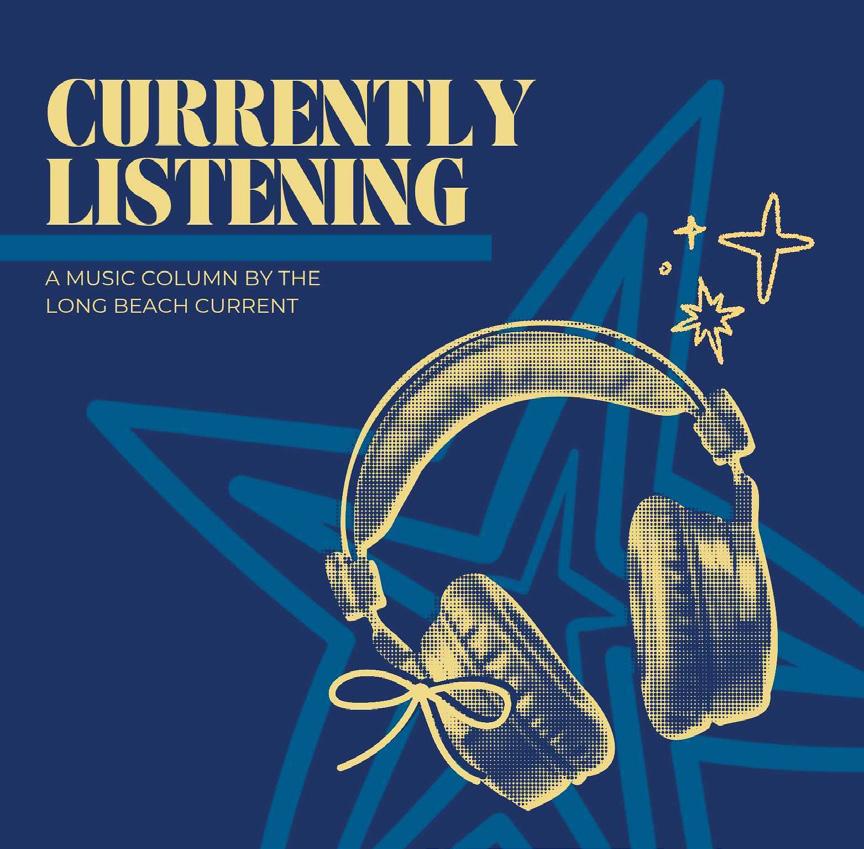
BY JAZMYN DE JESUS Social Media Editor
Moving to Long Beach as a transfer student in 2023 unveiled to me a city that was constantly providing spaces to enjoy and create art.
Many students at Long Beach State may be unaware of all of the access we have to creative spaces as locals, beyond campus. It is imperative that students who are graduating and want to work in music and art look to our city as a place to plant seeds for a career.
Vine LB, a popular bar on Long Beach’s 4th Street, hosts shows regularly where Los Angeles and Long Beach based artists perform for the community for free on a first-come-first-serve basis.
Musical duo The Tulips performed at Vine before performing on our campus in early April, which opened my eyes to the other bars and cafés, such as Recreational Coffee, that serve as spaces for open mics where original work and creative networks are built weekly in the city.
Seth Reeder, musician and owner of Collective Visions Enterprises, takes pride in being the owner

of a record studio in Long Beach.
“The people involved in music here feel much more genuine. We have so many resources and sometimes it’s not the wisest decision to go off to L.A. or somewhere else,” Reeder said.
Reeder said that he has drifted away from just being a recording studio owner, and is interested in artist development and strategy because of the talent that he has seen within Long Beach.
In southern California, it’s easy to feel as though Los Angeles is the promised land for those of us who want to pursue careers in the music industry. However, those of us in Long Beach would find it worth looking to our own city to begin careers here post-graduation.
If we do not create spaces to make art in the areas we reside in, communities do not thrive and industries feel overly saturated and competitive.
Reeder advised that being a voice of the city we come from and transmitting that perspective to major cities like L.A. is valuable to the music industry.
Students moving on to postgrad creative careers should not lose sight of the opportunities at our disposal here, in this iconic city and soon-to-be home of the Long Beach Bowl in 2026.

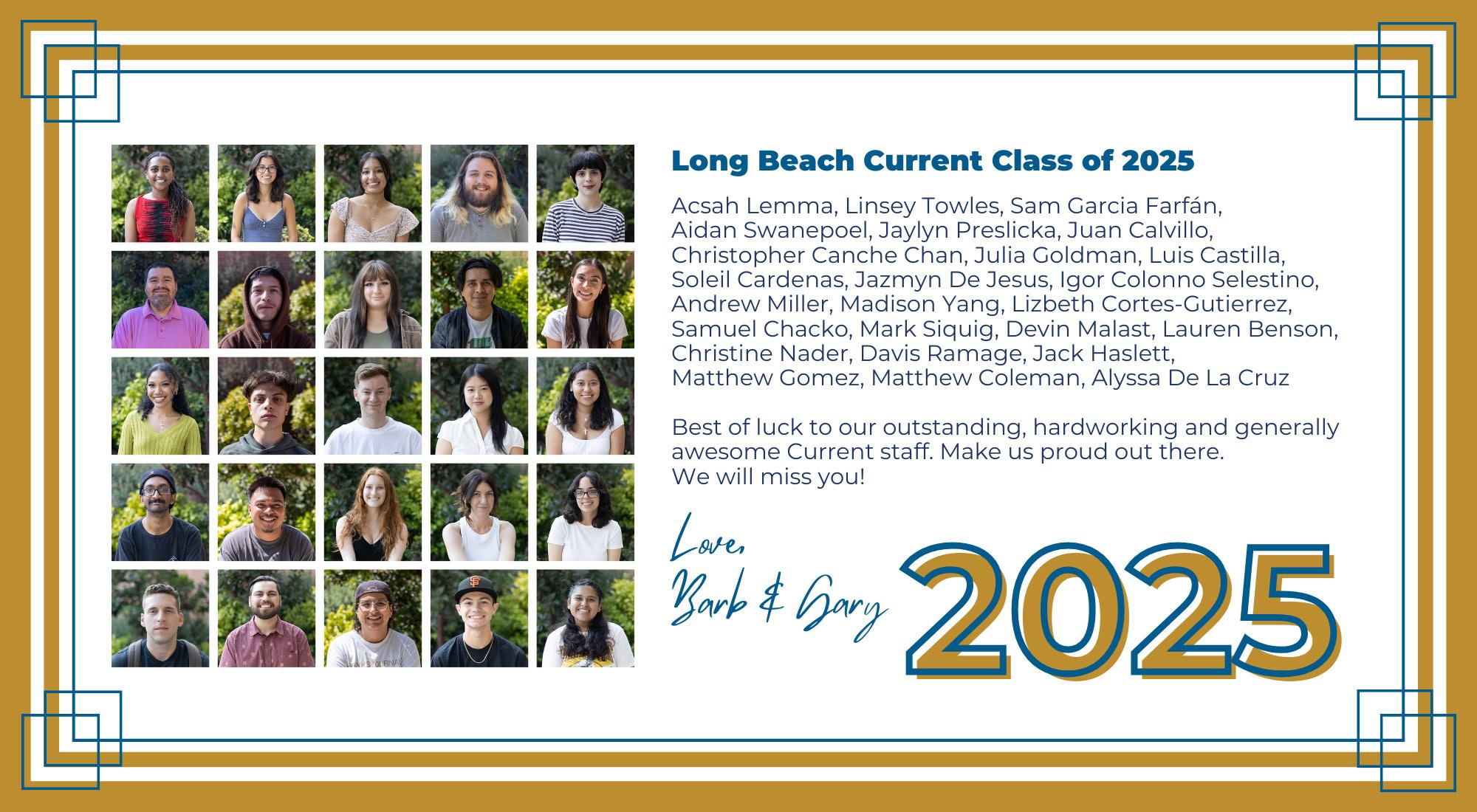
LBSU opposite hitter Skyler Varga serves up the ball against UCLA with over 1,000 students packed in the stands. Varga is one of the many men’s volleyball players who benefit from the men’s volleyball NIL collective.
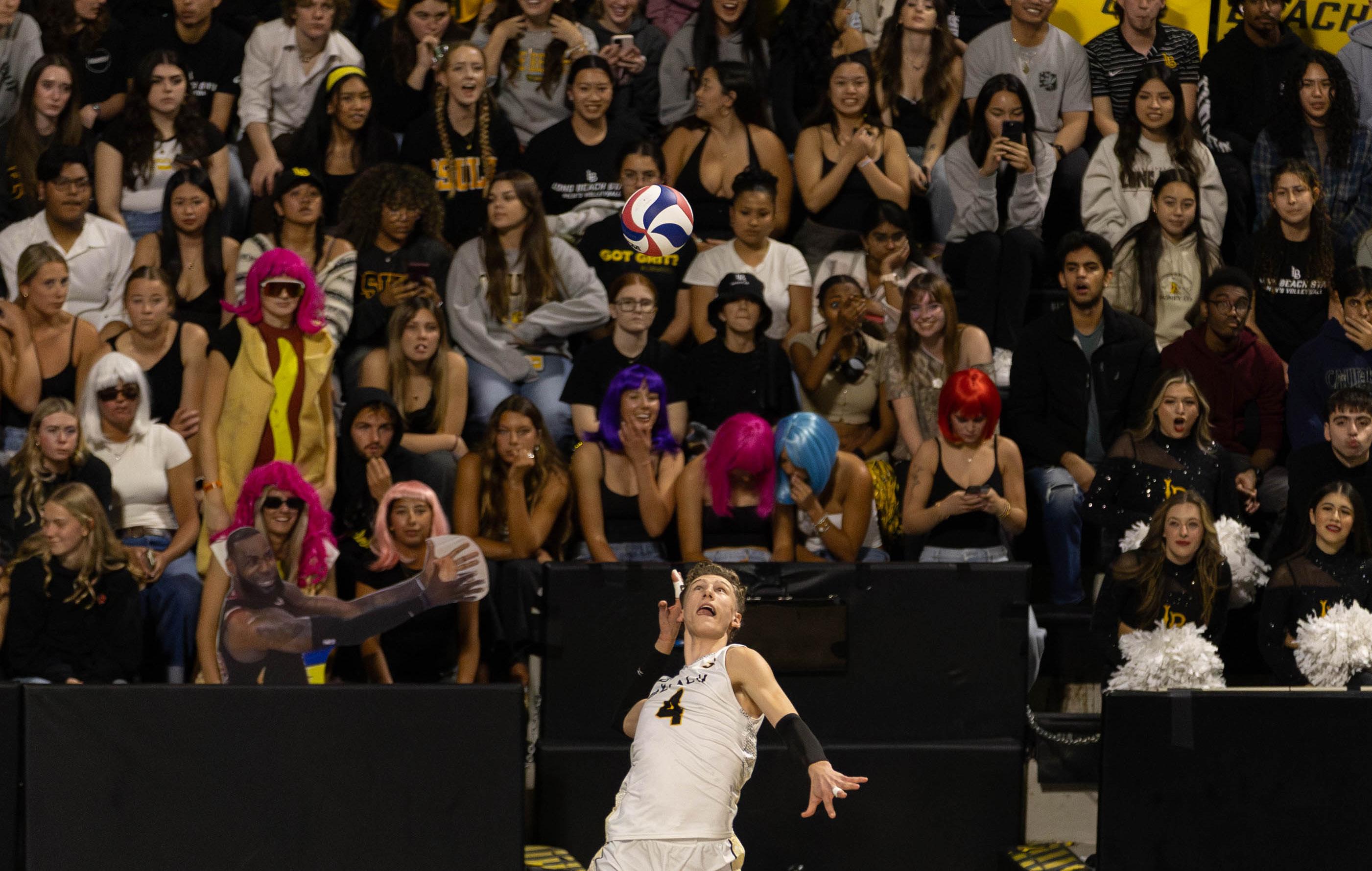
BY DAVIS RAMAGE & JACK HASLETT Sports Editor & Sports Assistant
Name, image and likeness is the ever-growing hot topic in college athletics. It affects college sports’ current and future landscape daily, but some schools struggle more than others, like Long Beach State.
With incoming freshmen such as BYU basketball player, A.J. Dybantsa, having a reported NIL evaluation of $3.8 million, this creates an appealing situation for recruits when choosing which college to attend.
It used to be that players would commit to schools based on the coach, the program, the location or other factors,
but now substantial money has become the biggest motivator.
“I do know that there have been a couple of athletes who have committed to particular schools, and then they change their commitment later because another school will come along and offer them a lot of money, like $200,000,” LBSU Sports Communications Professor and NIL Researcher Kevin Johnson said.
Many incoming players also hire agents to help with the NIL negotiation process, adding another factor to recruiting for college programs. Athletes and their families often still speak with coaches about the typical factors that would affect an athlete’s decision, such as fit and team culture, while agents communicate with programs about the money.
“As an assistant coach, or anyone on staff… a large percentage of your offseason is now just about NIL, that was never
a part of the recruiting aspect before,” Ali Tavakol, director of basketball operations for LBSU men’s basketball, said.
According to Tavakol, managing and maintaining NIL money at a mid-major university like LBSU requires help from all staff.
“It’s everyone’s jurisdiction, from our head coach [Chris Acker] all the way down to our graduate assistant,” Tavakol said. “The second the season ended, every meeting is about number one, how to get players, and at the end of the day, that’s NIL.”
Fundraising is the name of the NIL game at LBSU. Coaches and staff attend events with Long Beach community members to try and garner new donors and boosters to increase the funds the program has available to offer players.
“The focus isn’t, ‘oh, how do we get money?’ The focus is how do we outreach to the community and get to the people that want to help us while we help them at the same time,” Tavakol said.
Athletics programs do receive funds from a budget distributed by university administration, but that money goes towards scholarships and basic needs funding, not NIL collectives, according to Tavakol.
NIL money is managed by what are called collectives, funds separate from the university that are managed by ei-
ther an outside third party or by a staff member of an athletics program, according to Tavakol.
There are a myriad of NIL collectives, like the LBSU Men’s Basketball Alliance and the LBSU Men’s Volleyball Collective, which manage NIL funds for those specific programs. Money donated by boosters for NIL purposes is then added to these collectives to be used for compensating players.
“I’m excited for the creative possibilities, which includes NIL, which includes collectives,” Nick MacRae, LBSU men’s volleyball assistant coach and recruiting coordinator, said. “We’re super excited and hopeful that we will now have 12 scholarships, and then you can add on NIL and collectives, that’s very exciting in my lens.”
Another way to generate revenue is through merchandise sales. If the LBSU logo or name is a prominent part of the merchandise of collegiate athletes, then the school can take a larger cut. But if the t-shirt or jersey being sold just has the player’s name and number without including school or team logos, then more of the money goes to the athlete.
“When you bring in money, it turns the landscape into a professional sport,” Tavakol said “We’re beyond happy for these students… but it’s been absolutely flipped upside down.”
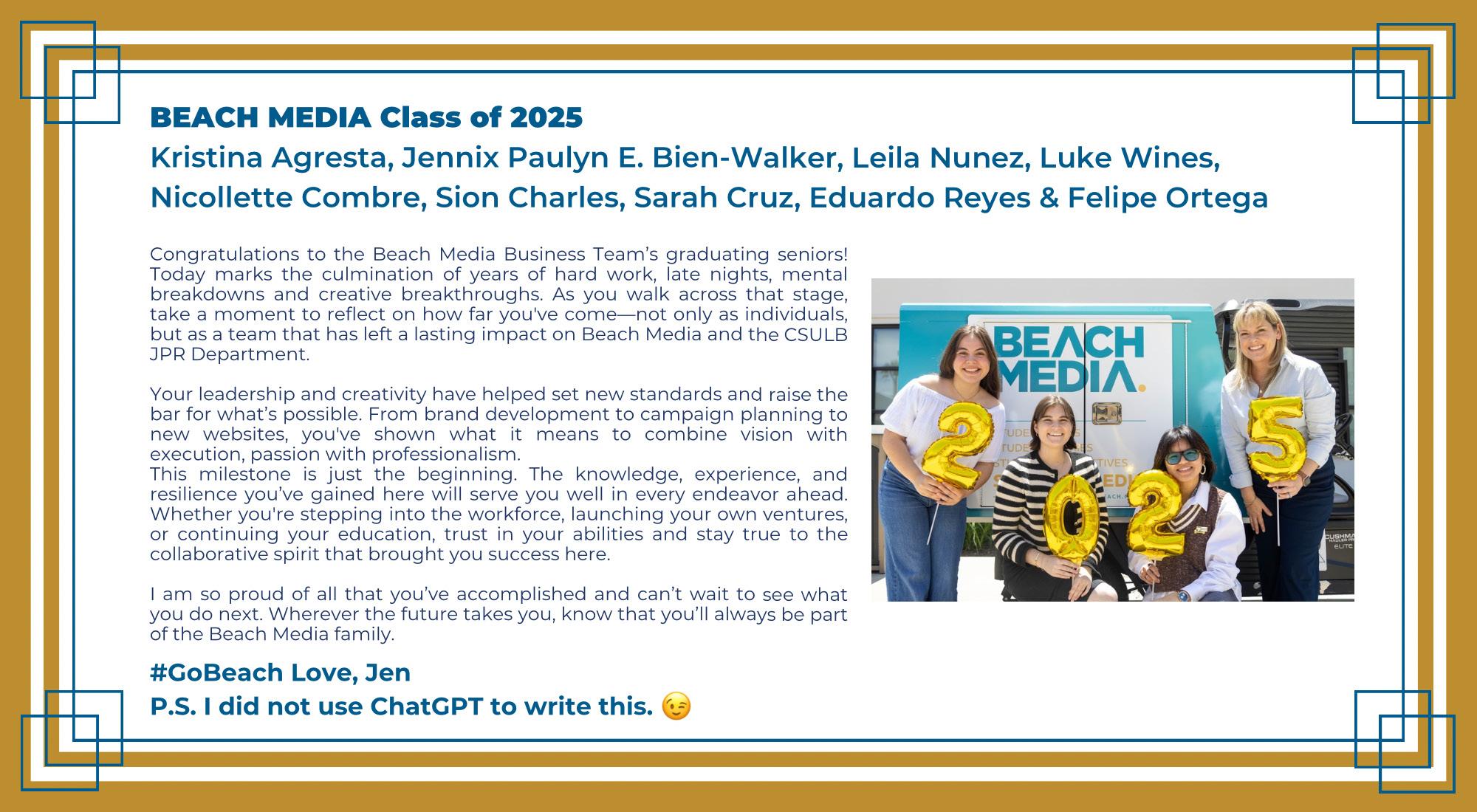
PAID ADVERTISEMENT

My time at The Beach has been the most rewarding of my career.
Thank you for your partnership in moving this remarkable university forward.
And to our new graduates, congratulations on your notable accomplishments.
You are the clearest examples of the fulfillment of our educational mission to educate Californians and be a force for good in higher education.

“ “
Jane Close Conoley, Ph.D. President
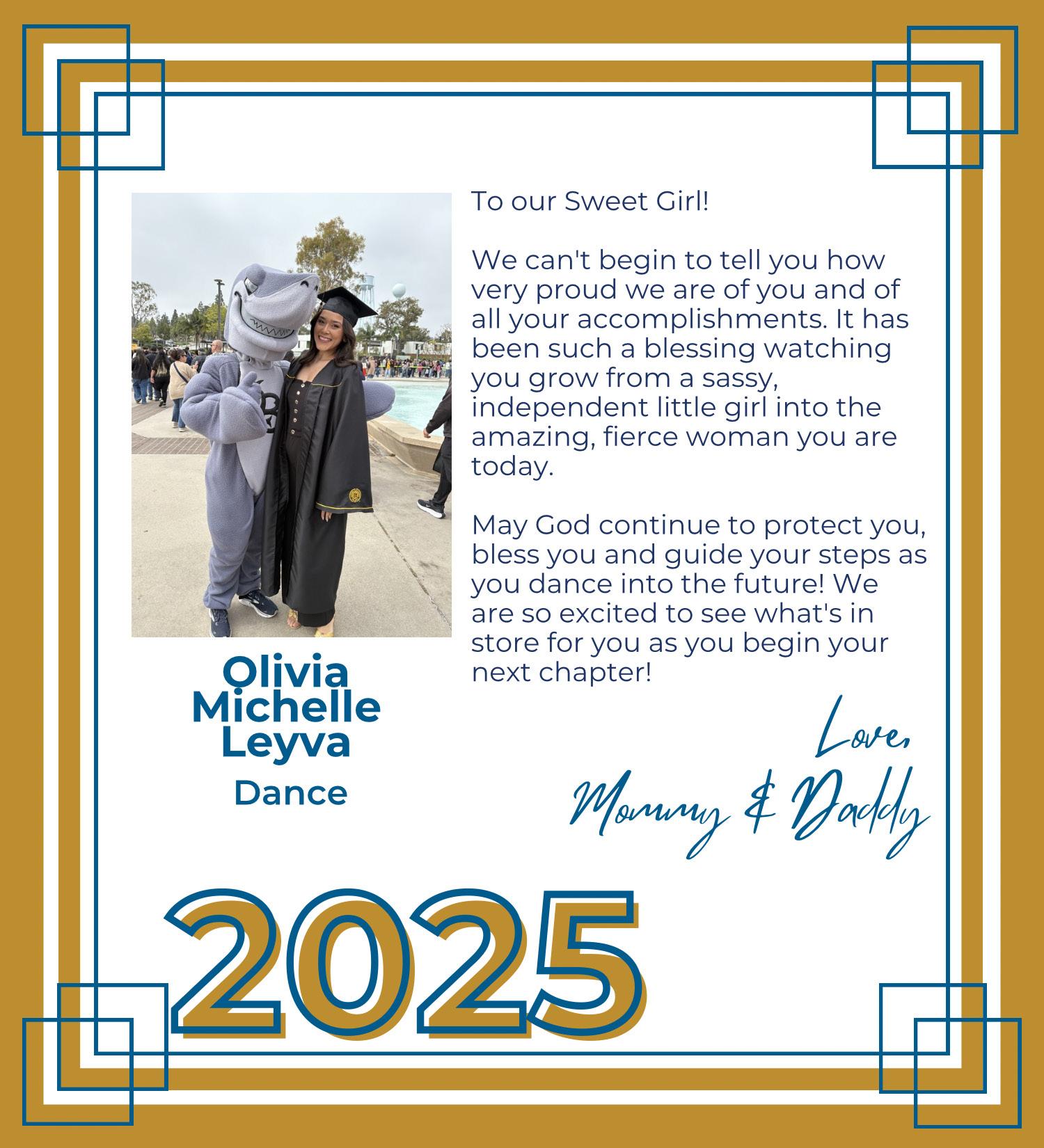

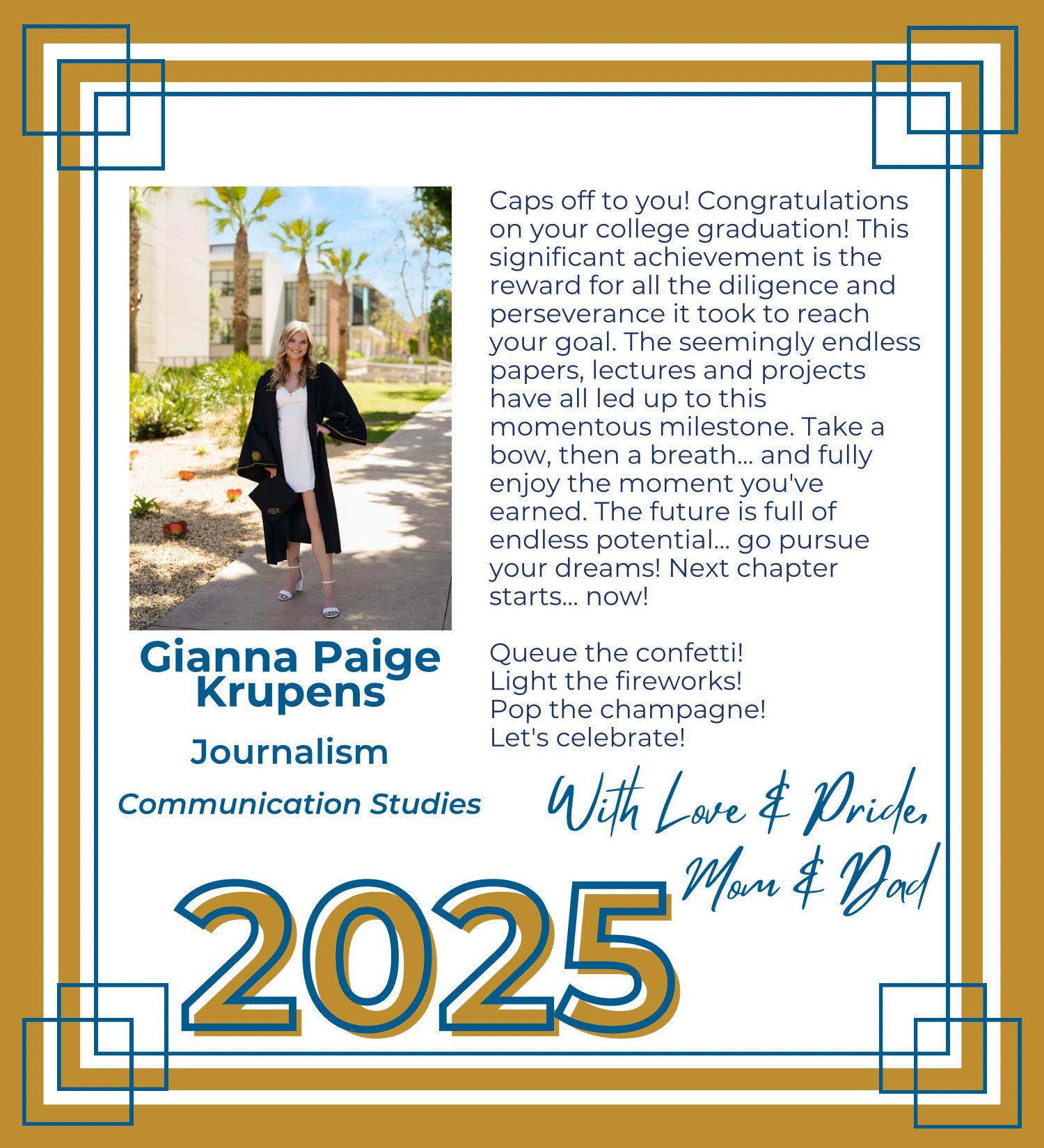
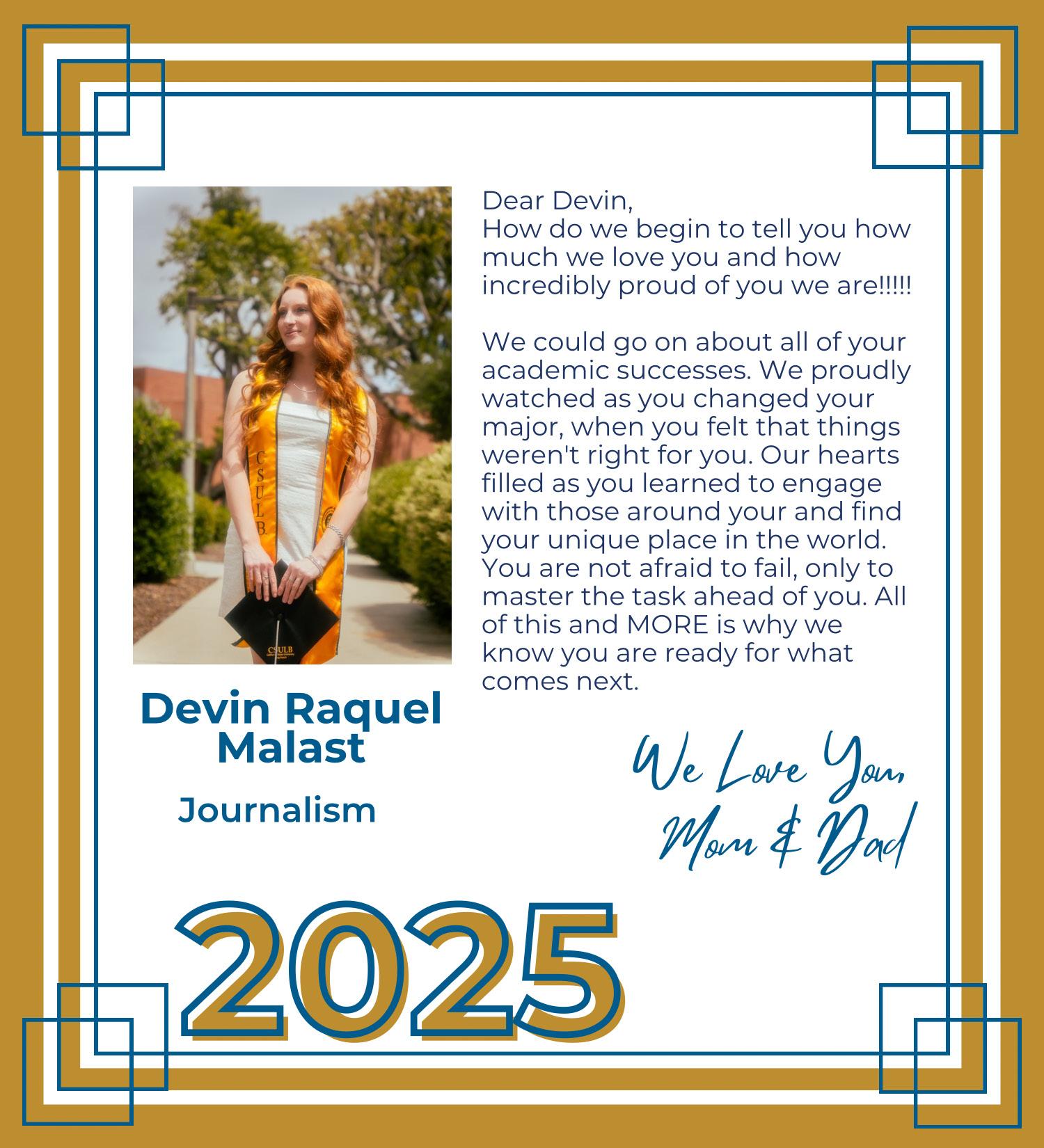
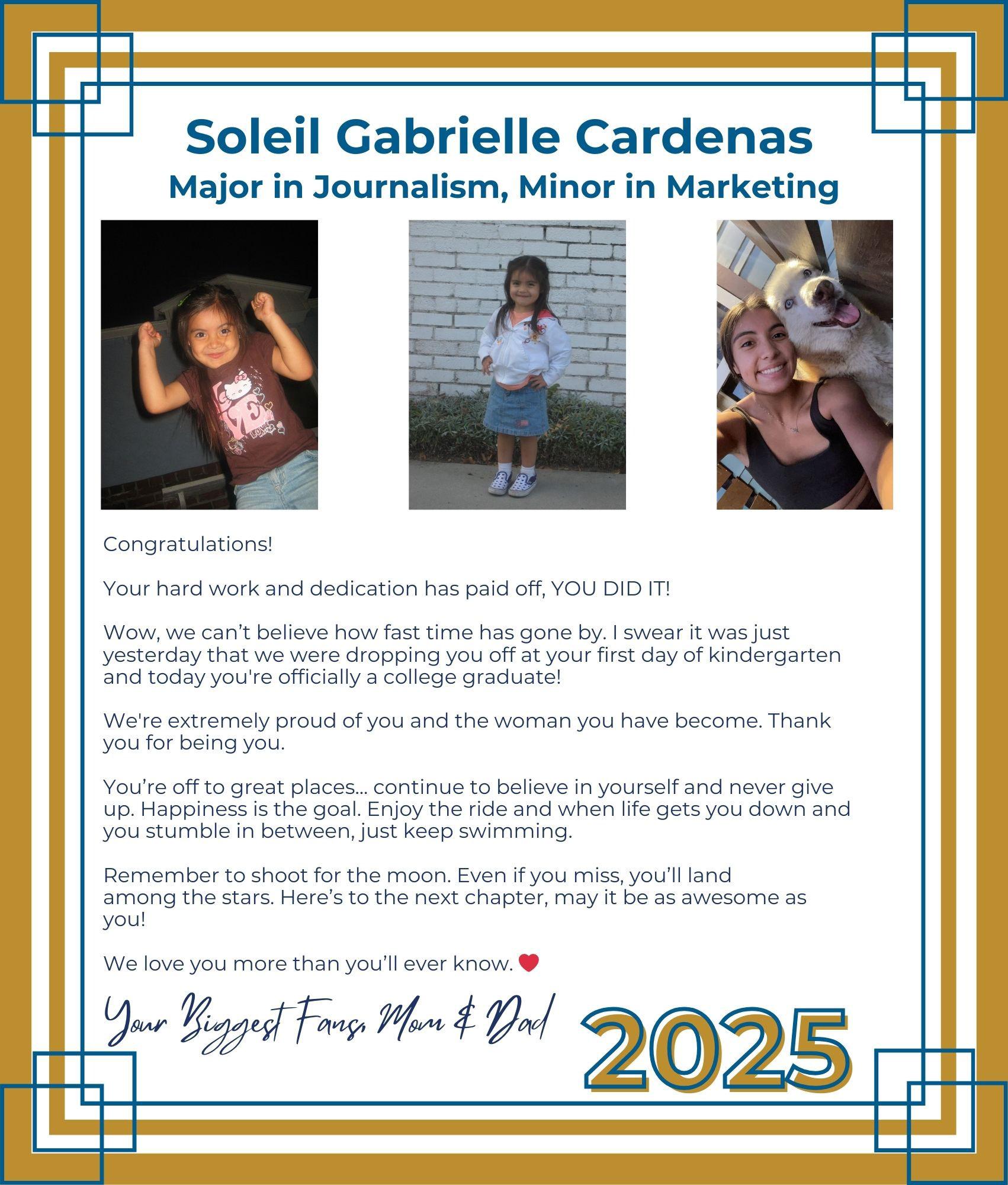


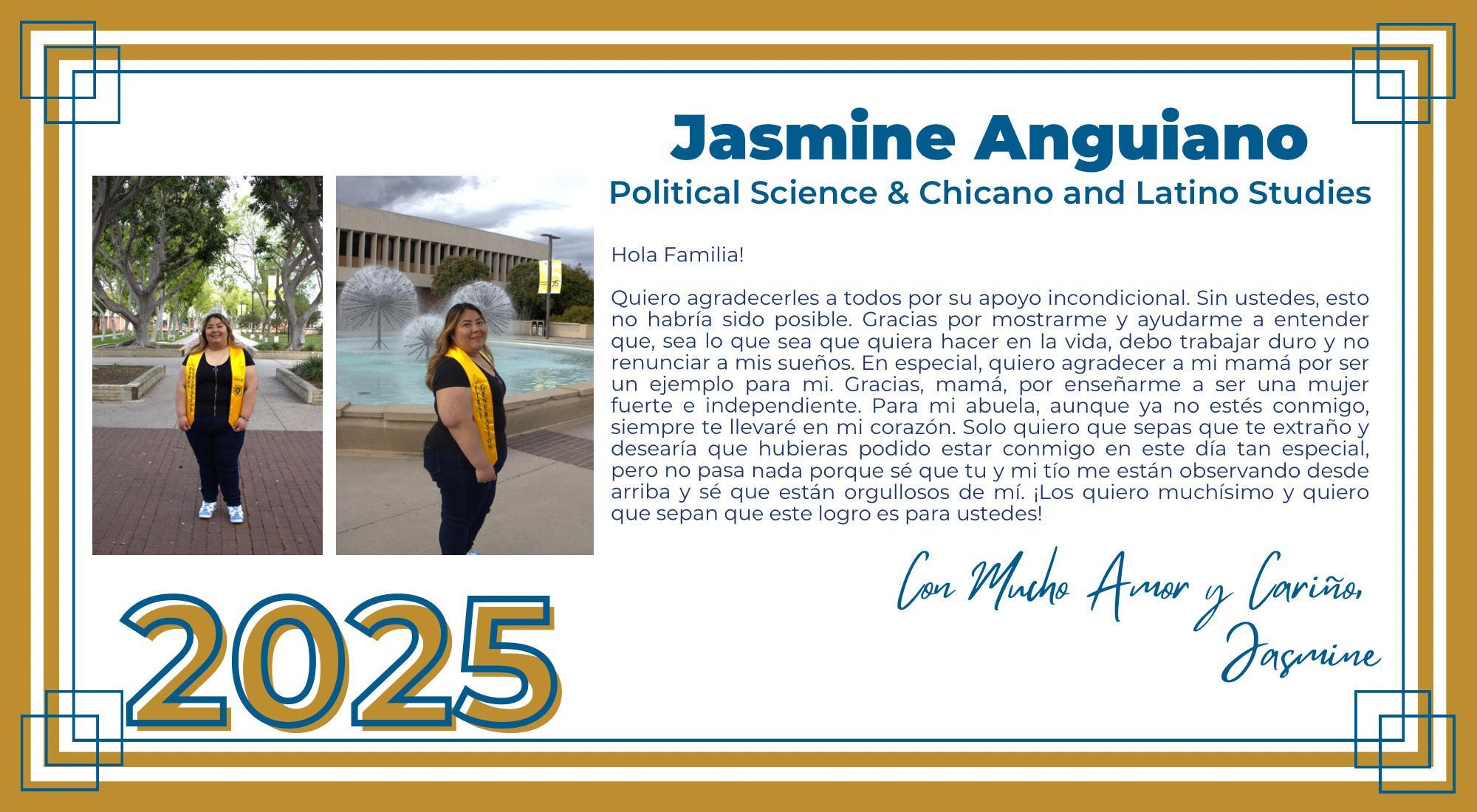
PAID ADVERTISEMENT

Tuesday, June 17, 10:00 AM – 4:00 PM
Need a jump start in your job search? Join other CSULB grads at our 2025 Job Search Success Conference to connect with employers who are currently hiring and to learn from recruiters about how to stand out as an applicant. Plus free food, fun prizes and more!
• “Recruiters' Guide to Getting a Job” Panel
• Mini Job Fair
• Free Lunch
• Opportunity Drawing for Disneyland
Resort Tickets & Nordstrom
Professional Clothing/Styling Package
• Complimentary Parking
SCAN TO REGISTER
To request disability-related accommodations, please contact the Bob Murphy Access Center at (562) 985-5401 | bmac@csulb.edu


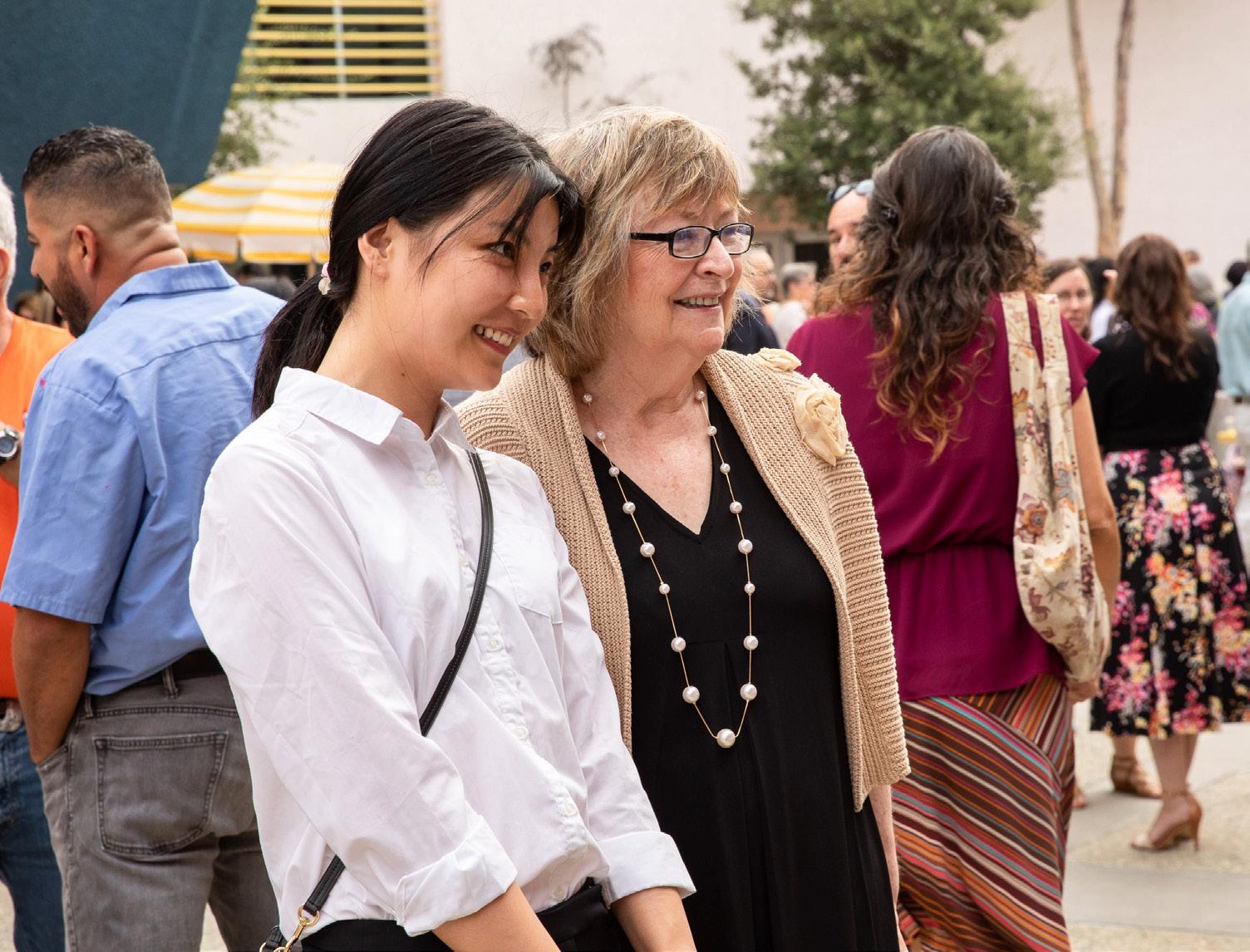
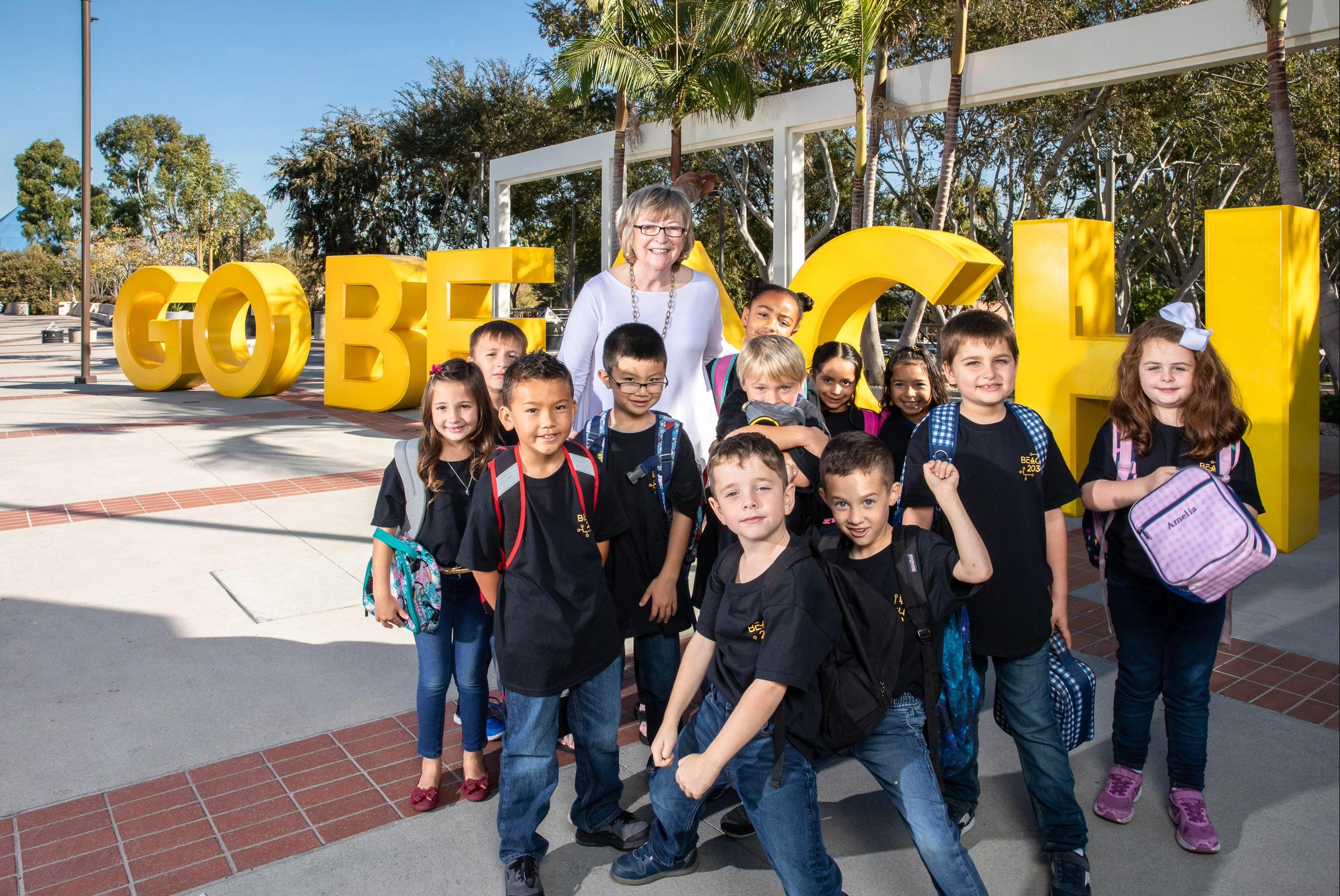
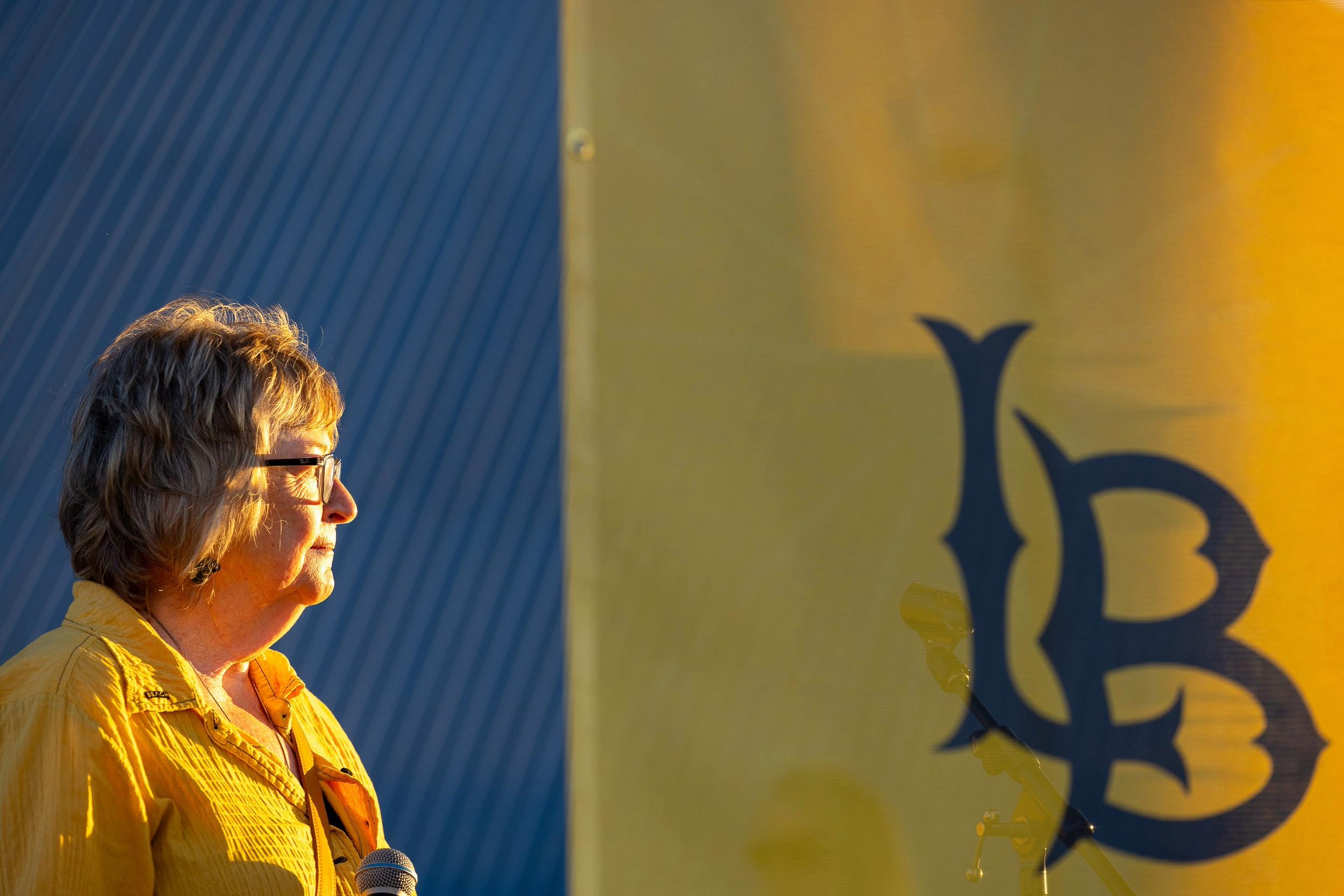
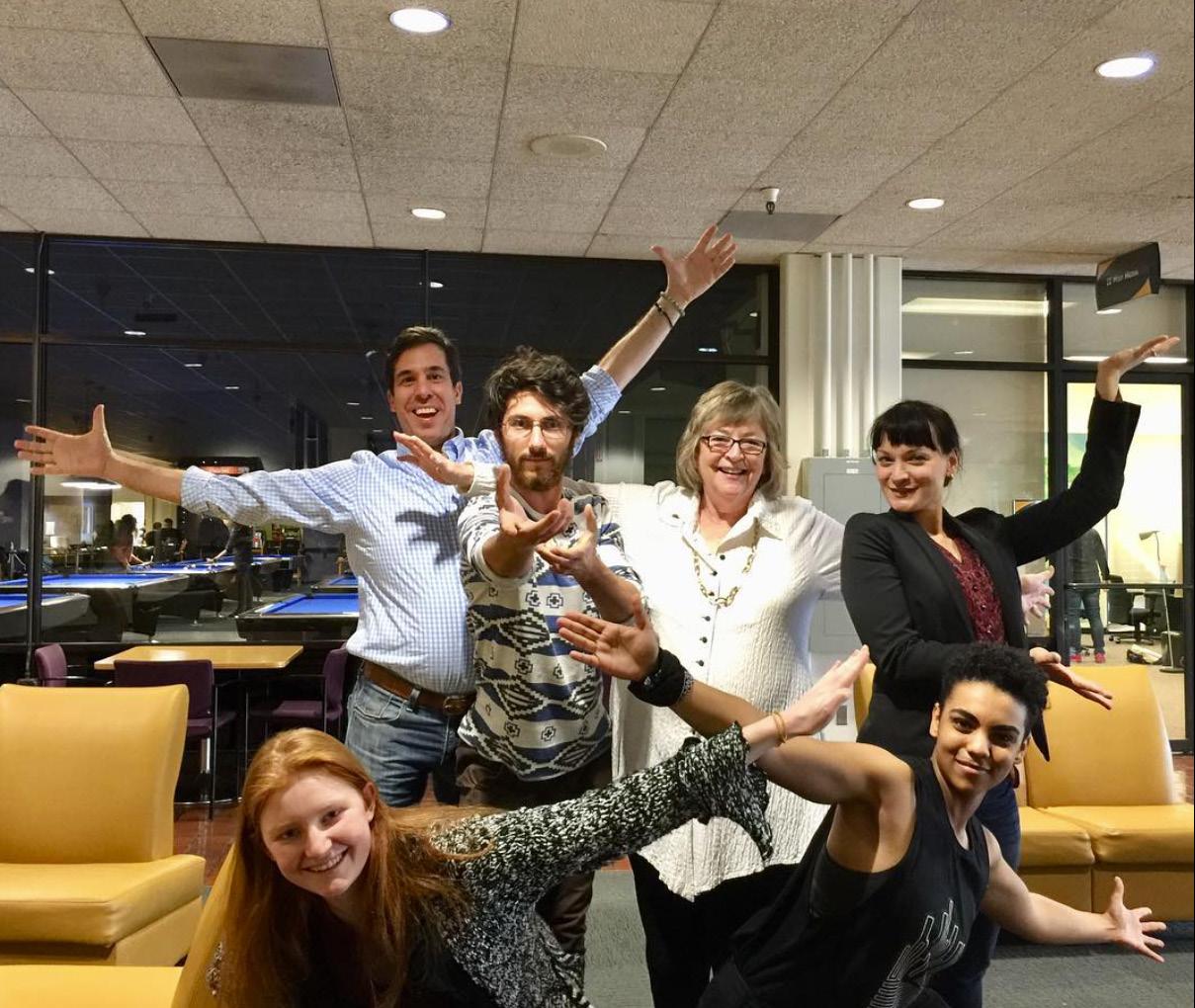
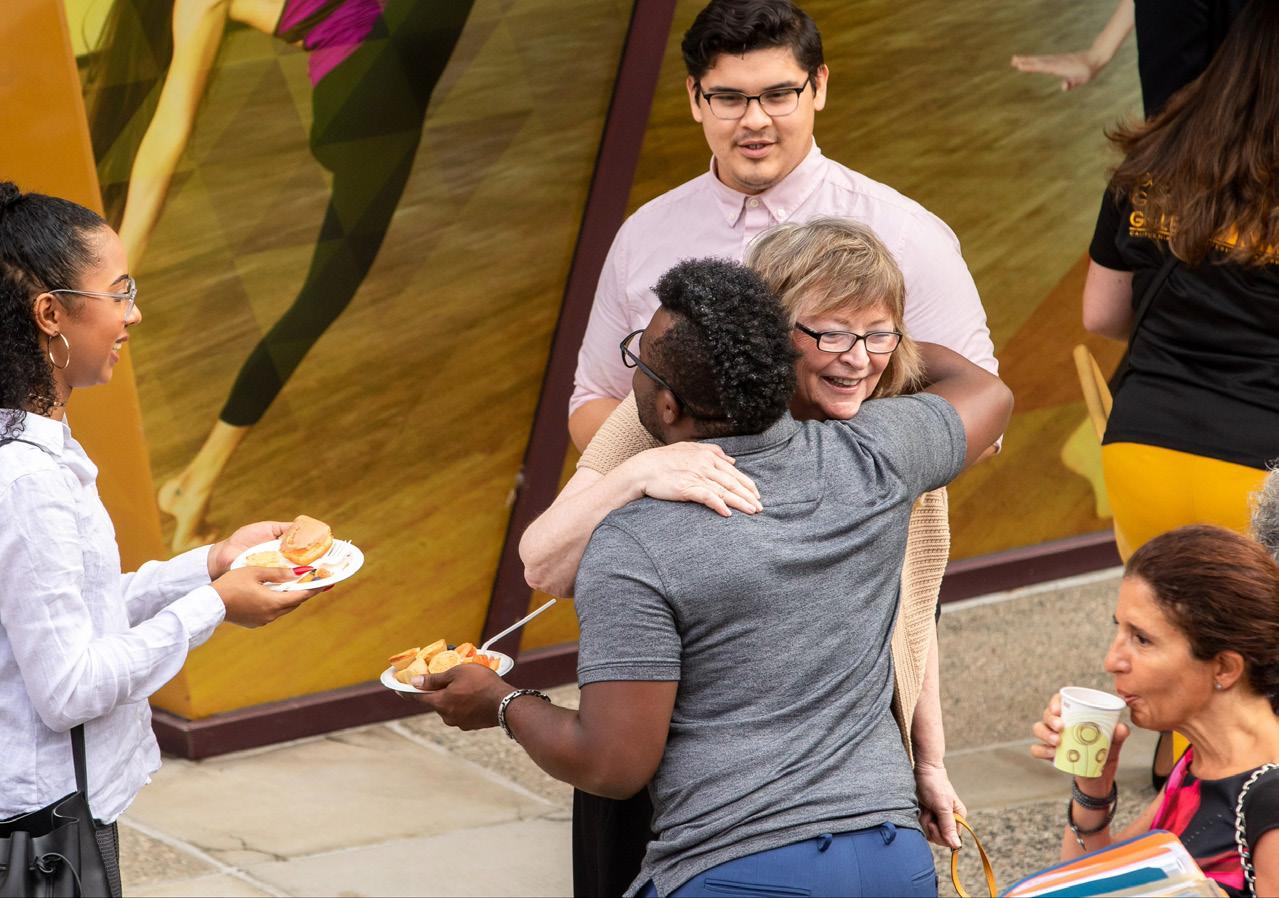
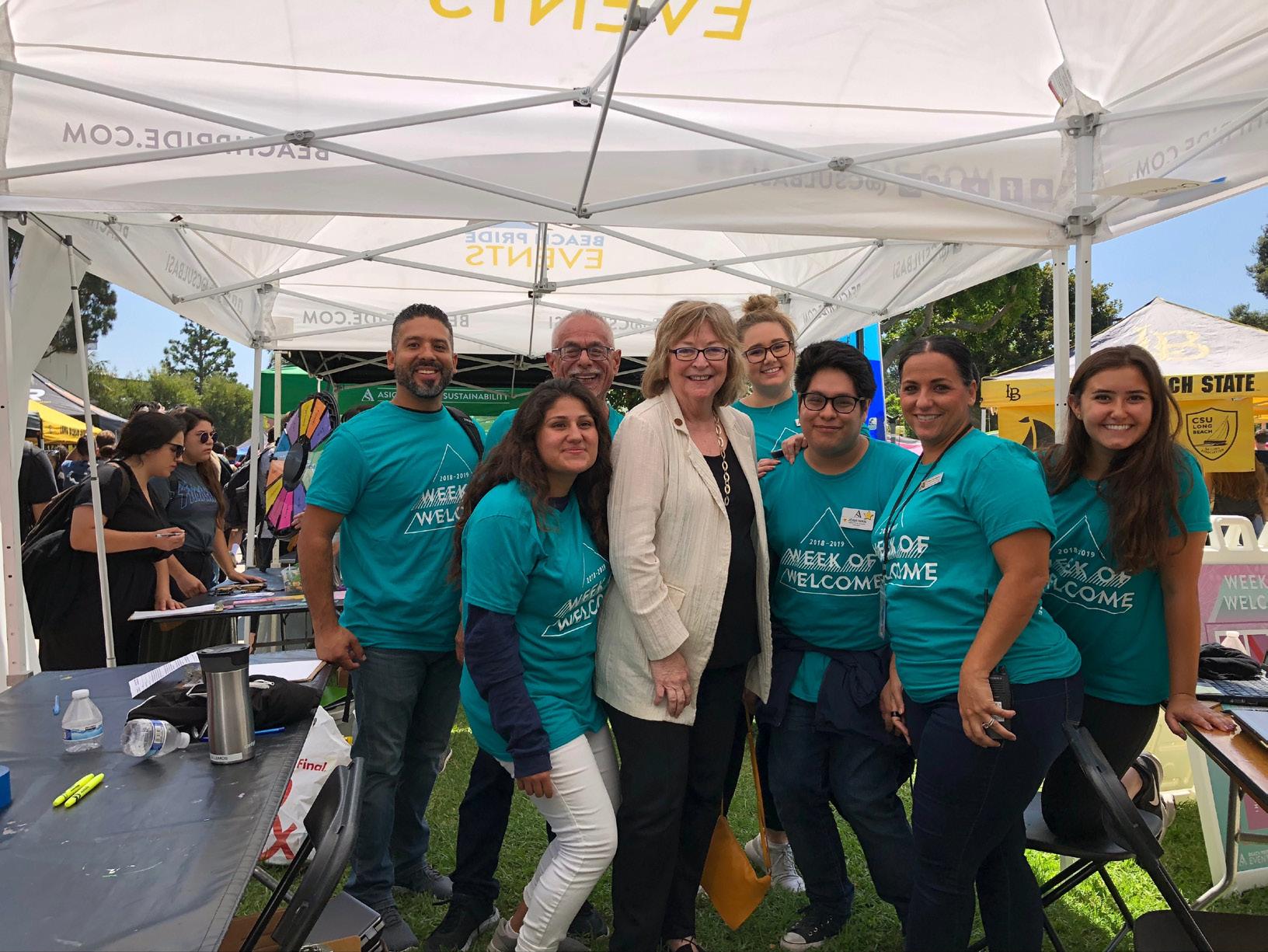
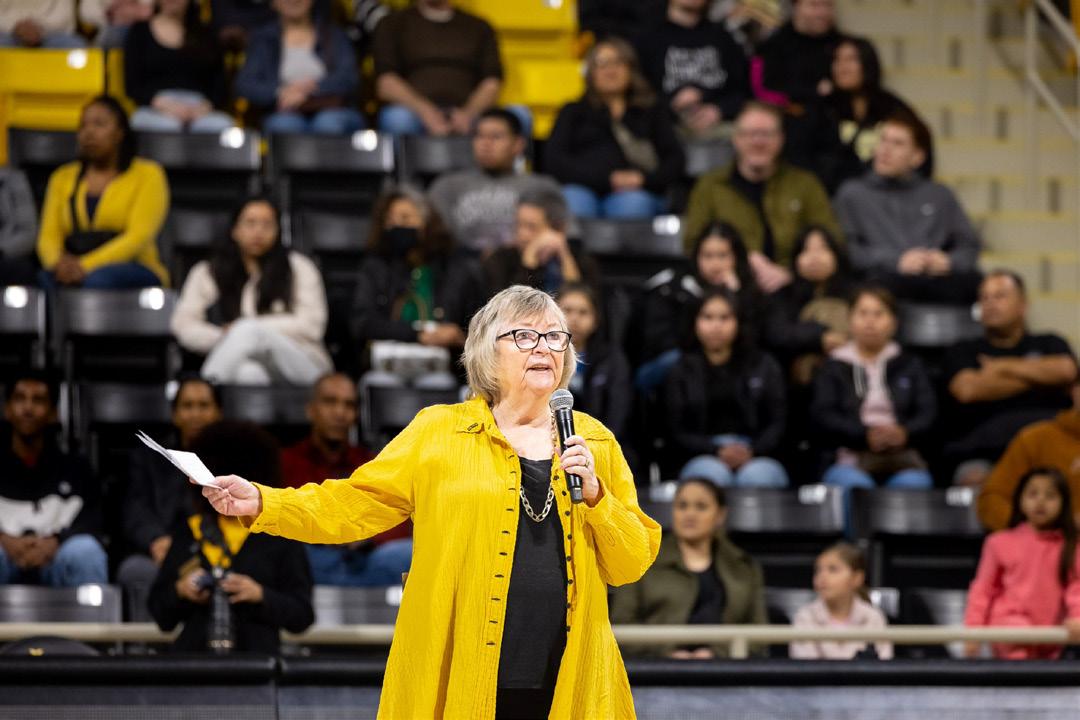
Thank you for 11 years of caring leadership. We wish you a happy retirement.






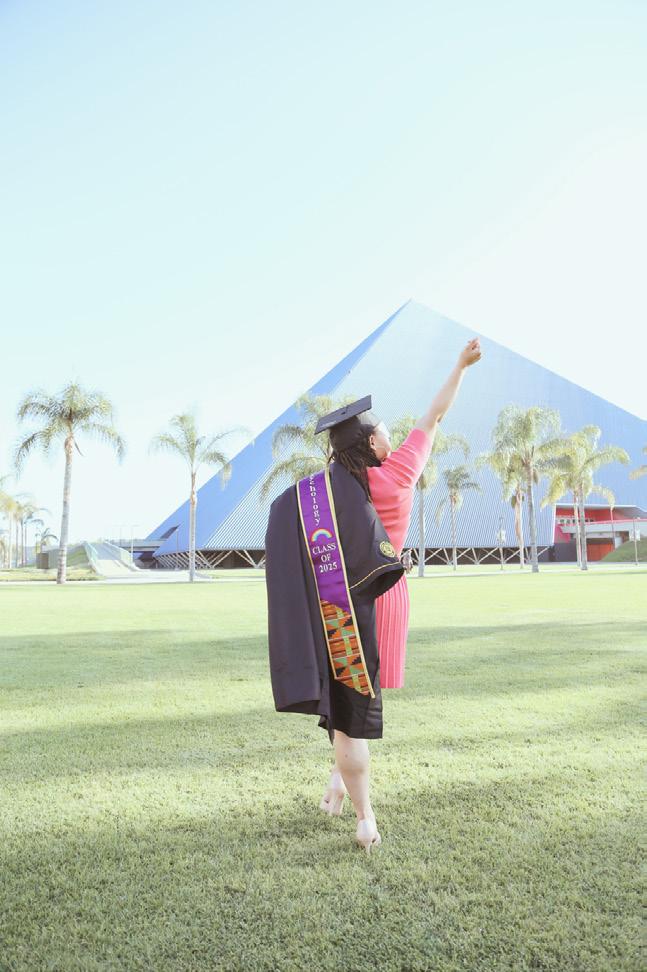
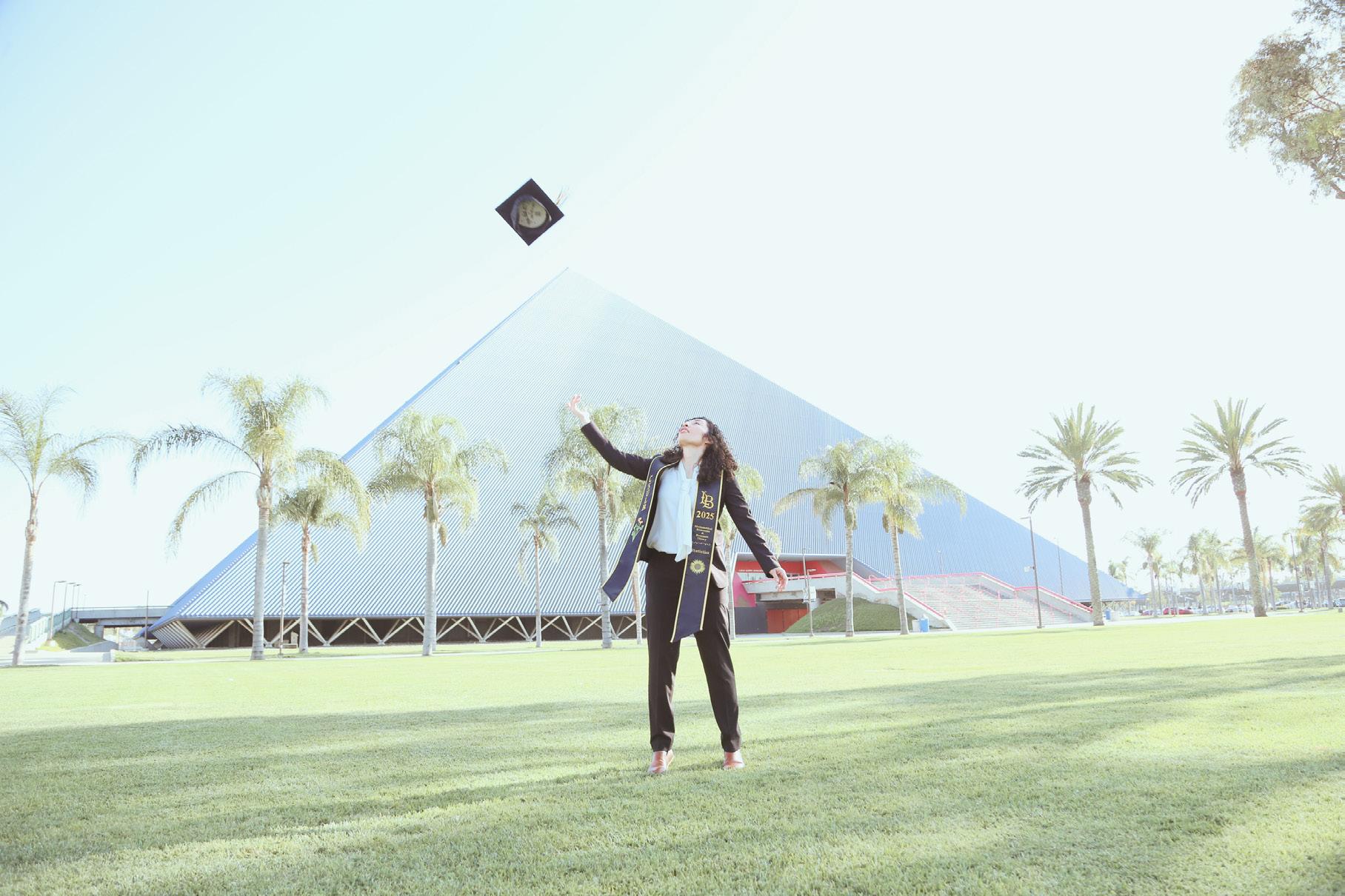
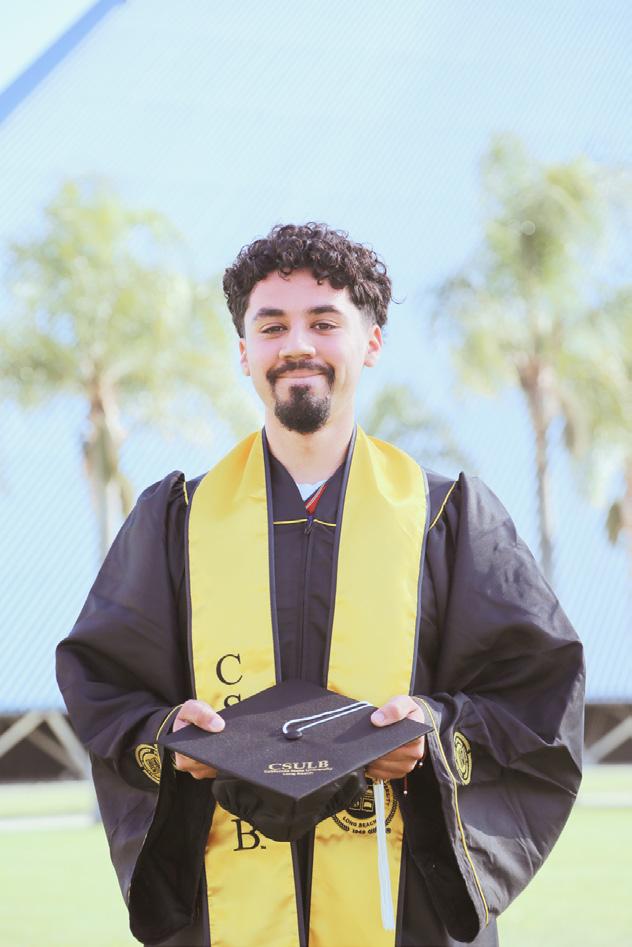
TRIO
TRIO MCNAIR SCHOLARS PROGRAM
COLLEGE ASSISTANCE MIGRANT PROGRAM
